THEMESSENGER
June, 1942


June, 1942

"JUMP" is the command that starts you on that headlong earthward plunge through space, but the real order of the hour is steady nerves! For these soldiers of the sky-for eve, y one of ml So cake a tip from the men in the front line. Their favorite is Camelthe slow-burning, mild cigarette. Make Camel your cigarette, too.

YOU BET I SMOKE CAMELS. THEY'RE EXTRA MILD AND THEY ALWAYS TASTE GREAT
With men in the Army, the Navy, the Marine Corps, and the Coast Guard, the favor ice cigarette is Camel. (Based 011 ({Cfll({l sales records in Post Exchanges, Sales Commissaries, Ship·s Service Stores, Ship·s Stores , and Canteens )
"I HELP MAKE THOSE PARACHUTES," says Helen V . Lynch , Pioneer Parachute Company employe e, "and I can cell you 'nerves' don ' t go in my job Smoke ? Yes , I enjoy smoking. I smoke Camel s. They have the mildness that counts and Camel s don't tire my taste. " Yes, for all of us , this is a "war of nerves ." More important than eve r, now, is your choice of cigarettes. Smoke Came l s.
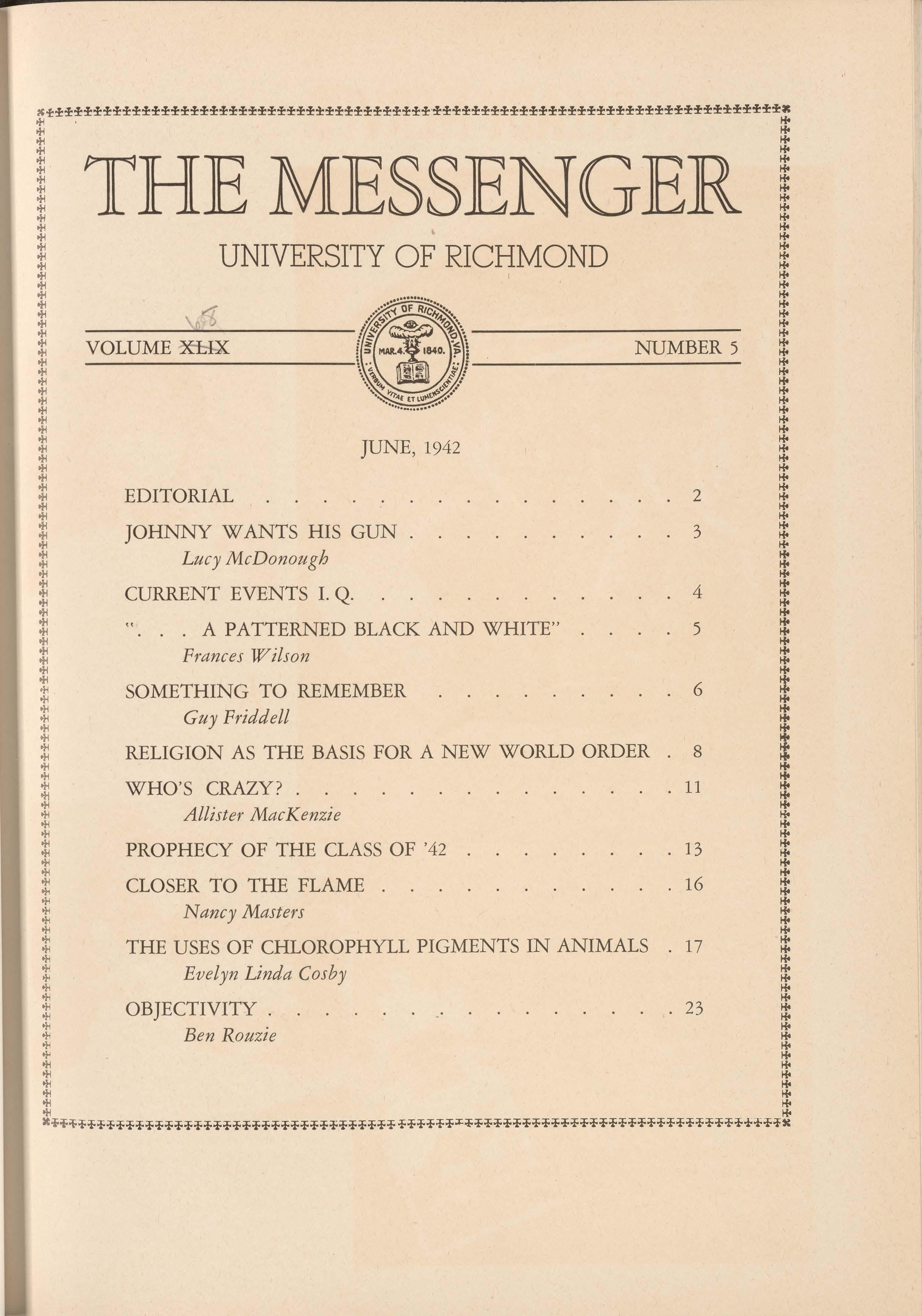
UNIVERSITY OF RICHMOND
Editor-in-Chief
MARY GRACE SCHERER
Richmond College Editor Westhampton College Editor
ALLISTER McKENZIE
JANICE LANE
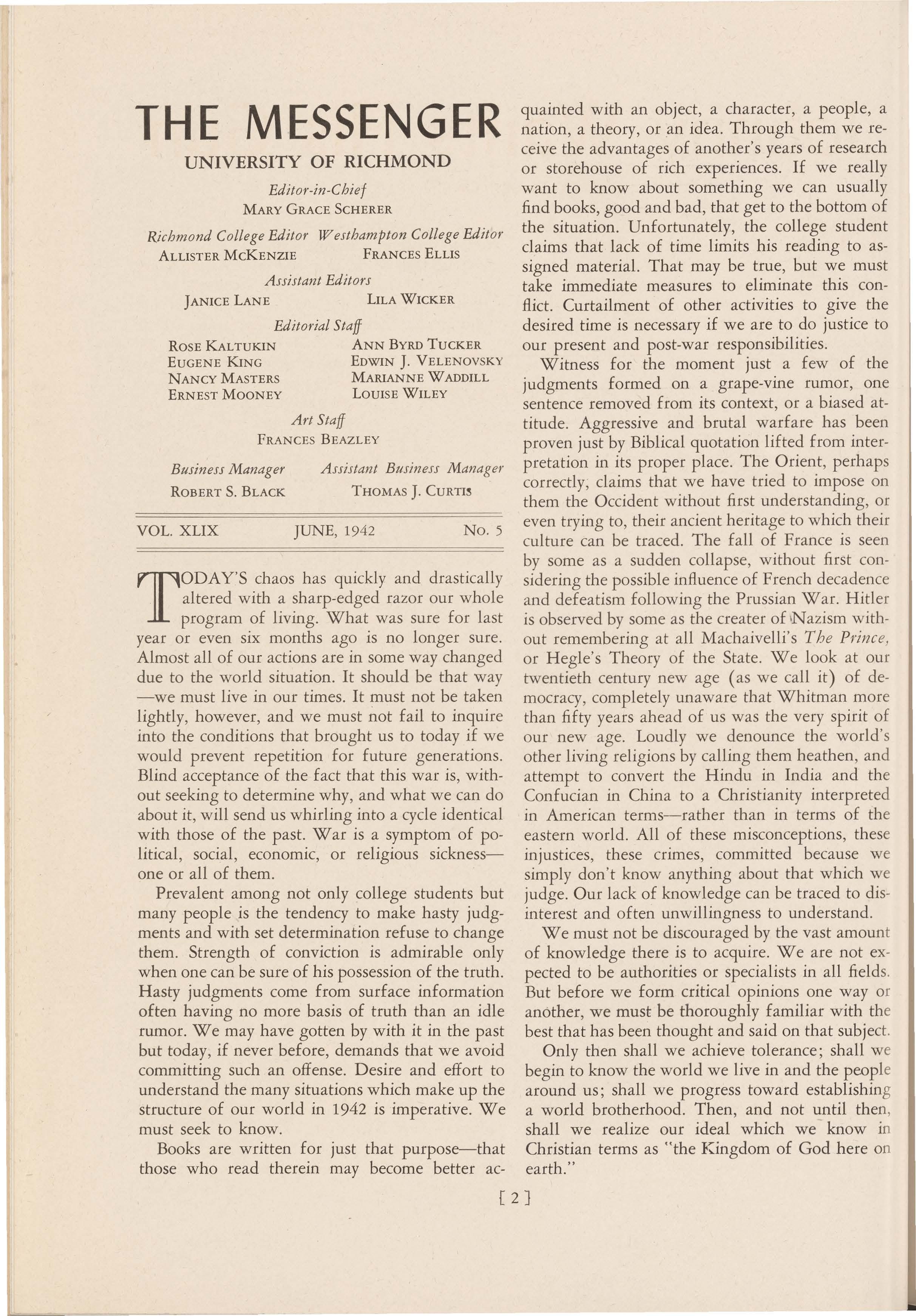
FRANCES ELLIS
Assistant Editors
LILA WICKER
ROSE KAL TUKIN
EUGENE KING
NANCY MASTERS
ERNEST MOONEY
Editorial Staff
ANN BYRD TUCKER
EDWIN J. VELENOVSKY
MARIANNE WADDILL
LOUISE WILEY
Art Staff
FRANCES BEAZLEY
Business Manager
ROBERTS. BLACK
VOL. XLIX
TAssistant Business Manager
THOMAS J. CuRTI5
JUNE, 1942 No. 5
ODAY'S chaos has quickly and drastically altered with a sharp-edged razor our whole program of living. What was sure for last year or even six months ago is no longer sure. Almost all of our actions are in some way changed due to the world situation. It should be that way -we must live in our times. It must not be taken lightly, however, and we must not fail to inquire into the conditions that brought us to today if we would prevent repetition for future generations. Blind acceptance of the fact that this war is, without seeking to determine why, and what we can do about it, will send us whirling into a cycle identical with those of the past. War is a symptom of political, social, economic, or religious sicknessone or all of them .
Prevalent among not only college students but many people is the tendency to make hasty judgments and with set determination refuse to change them. Strength of conviction is admirable only when one can be sure of his possession of the truth. Hasty judgments come from surface information often having no more basis of truth than an idle rumor. We may have gotten by with it in the past but today, if never before, demands that we avoid committing such an offense. Desire and effort to understand the many situations which make up the structure of our world in 1942 is imperative. We must seek to know.
Books are written for just that purpose-that those who read therein may become better ac-
quainted with an object, a character, a people, a nation, a theory, or an idea. Through them we receive the advantages of another's years of research or storehouse of rich experiences. If we really want to know about something we can usually find books, good and bad, that get to the bottom of the situation. Unfortunately, the college student claims that lack of time limits his reading to assigned material. That may be true, but we must take immediate measures to eliminate this conflict. Curtailment of other activities to give the desired time is necessary if we are to do justice to our present and post-war responsibilities.
Witness for the moment just a few of the judgments formed on a grape-vine rumor, one sentence removed from its context, or a biased attitude. Aggressive and brutal warfare has been proven just by Biblical quotation lifted from interpretation in its proper place. The Orient, perhaps correctly, claims that we have tried to impose on them the Occident without first understanding, or even trying to, their ancient heritage to which their culture can be traced. The fall of France is seen by some as a sudden collapse, without first considering the possible influence of French decadence and defeatism following the Prussian War. Hitler is observed by some as the creater of Nazism without remembering at all Machaivelli's The Princ e, or Hegle's Theory of the State. We look at our twentieth century new age ( as we call it) of democracy, completely unaware that Whitman more than fifty years ahead of us was the very spirit of our new age. Loudly we denounce the world ' s other living religions by calling them heathen, and attempt to convert the Hindu in India and the Confucian in China to a Christianity interpreted in American terms-rather than in terms of the eastern world. All of these misconceptions, these injustices, these crimes, committed because we simply don't know anything about that which w e judge. Our lack of knowledge can be traced to disinterest and often unwillingness to understand.
We must not be discouraged by the vast amoun t of knowledge there is to acquire. We are not expected to be authorities or specialists in all fields . But before we form critical opinions one way or another, we must be thoroughly familiar with th e best that has been thought and said on that subject.
Only then shall we achieve tolerance; shall w e begin to know the world we live in and the peopl e around us; shall we progress toward establishin g a world brotherhood. Then, and not until then , shall we realize our ideal which we know in Christian terms as "the Kingdom of God here on earth."
[ 2}
By LUCY McDONOUGH, '42
DURING wartime , men join the armed forces with the sole object of fighting. Although this idea that our men in uniform wa nt to fight may never have occurred to a large nu mber of people, it is nevertheless true . Those wh o fear active duty are not the thousands of men assigned to the camps and
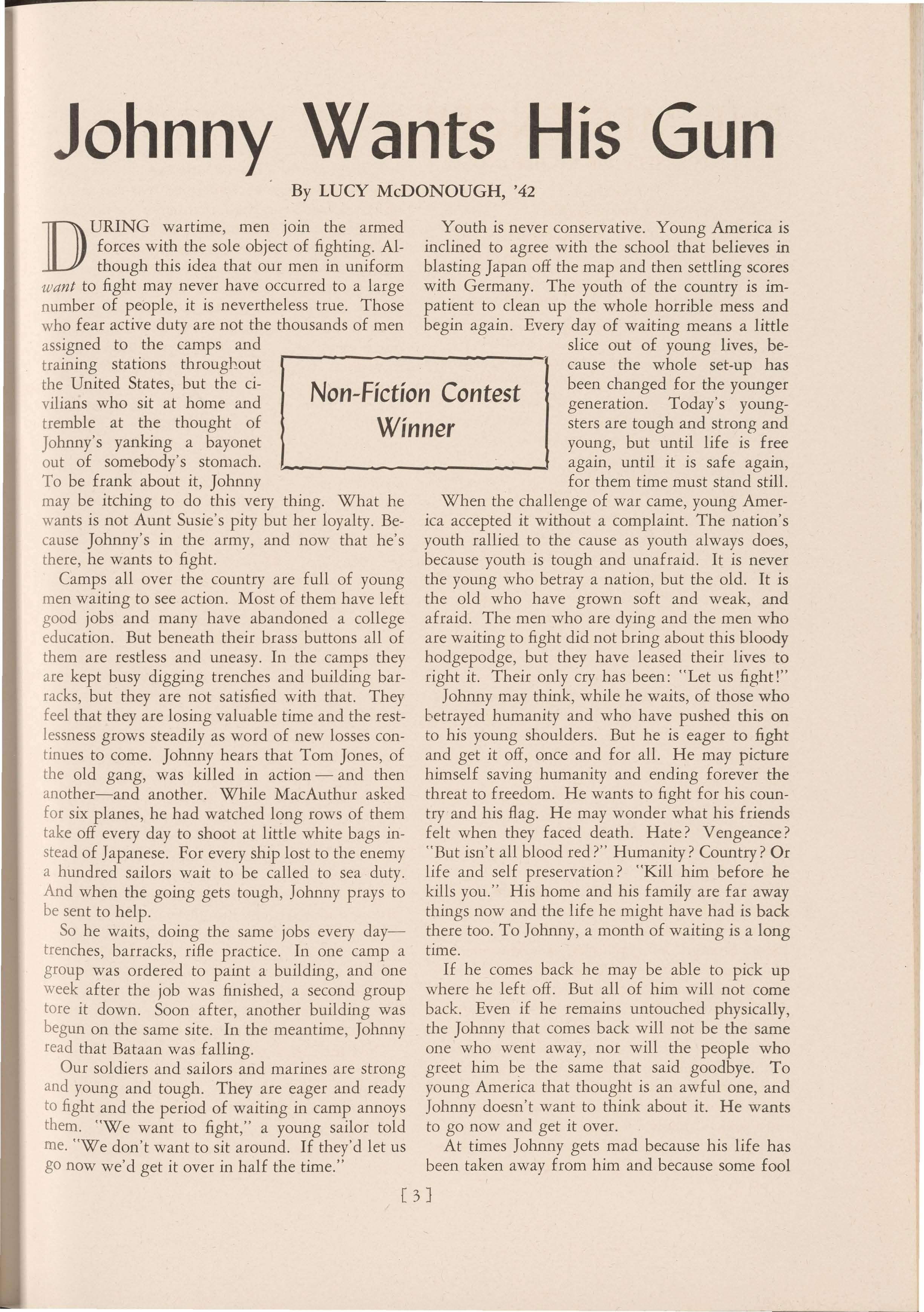
Youth is never conservative. Young America is inclined to agree with the school that believes in blasting Japan off the map and then settling scores with Germany. The youth of the country is impatient to clean up the whole horrible mess and begin again. Every day of waiting means a little slice out of young lives, betra ining stations throughout the United States , but the civil ians who sit at home and tre mble at the thought of Jo hnny's yanking a bayonet ou t of somebody ' s stomach.
To be frank about it, Johnny may be itching to do this very thing What he wa nts is not Aunt Susie's pity but her loyalty Because Johnny's in the army, and now that he's the re , he wants to fight.
Camps all over the country are full of young men waiting to see action. Most of them have left goo d jobs and many have abandoned a college edu cation. But beneath their brass buttons all of them are restless and uneasy In the camps they are kept busy digging trenches and building barracks, but they are not satisfied with that. They feel that they are losing valuable time and the restlessness grows steadily as word of new losses continues to come. Johnny hears that Tom Jones, of the old gang, was killed in action - and then ano ther-and another. While MacAuthur asked for six planes, he had watched long rows of them take off every day to shoot at little white bags instead of Japanese. For every ship lost to the enemy a h undred sailors wait to be called to sea duty. And when the going gets tough, Johnny prays to be sent to help
So he waits , doing the same jobs every daytrenches, barracks, rifle practice. In one camp a grou p was ordered to paint a building, and one week after the job was finished, a second group tore it down. Soon after, another building was begun on the same site. In the meantime , Johnny read that Bataan was falling.
O ur soldiers and sailors and marines are strong and young and tough They are eager and ready to fight and the period of waiting in camp annoys them. "We want to fight, " a young sailor told me. " We don ' t want to sit around. If they'd let us go n ow we'd get it over in half the time."
cause the whole set-up has been changed for the younger generation. Today's youngsters are tough and strong and young, but until life is free
again, until it is safe again, for them time must stand still.
When the challenge of war came, young America accepted it without a complaint. The nation's youth rallied to the cause as youth always does, because youth is tough and unafraid. It is never the young who betray a nation, but the old. It is the old who have grown soft and weak, and afraid. The men who are dying and the men who are waiting to fight did not bring about this bloody hodgepodge, but they have leased their lives to right it. Their only cry has been: "Let us fight!"
Johnny may think, while he waits , of those who betrayed humanity and who have pushed this on to his young shoulders. But he is eager to fight and get it off, once and for all. He may picture himself saving humanity and ending forever the threat to freedom. He wants to fight for his country and his flag He may wonder what his friends felt when they faced death. Hate? Vengeance? "But isn't all blood red? " Humanity? Country? Or life and self preservation? "Kill him before he kills you." His home and his family are far away things now and the life he might have had is back there too. To Johnny , a month of waiting is a long time . If he comes back he may be able to pick up where he left off. But all of him will not come back. Even if he remains untouched physically, the Johnny that comes back will not be the same one who went away, nor will the people who greet him be the same that said goodbye. To young America that thought is an awful one, and Johnny doesn't want to think about it. He wants to go now and get it over.
At times Johnny gets mad because his life has been taken away from him and because some fool
[ 3 J
didn't have the brains or the guts to know what really counts in this world. He gets mad and he wants to annihilate anybody who threatens to trample his country's back yard. It is especially at times like this that Johnny can't understand why he has to wait. His country needs him and he is ready to go. Yet he remains in camp and reads his newspaper, full of battles and death. From his same camp whole regiments are being sent away every week and new ones are arriving, and still he waits. At the U.S.O. he dances energetically and he yells lustily at ball games. But still he has too much time to think.
A sailor remarks that some of the men at his station have no uniforms, and yet he sees women stride by in full war regalia. A soldier tells him that an entire regiment ordered to foreign service was sent back to camp because of an epidemic of yellow jaundice. When they could not get treatment in the overcrowded hospitals, men lay on
army cots in tents pitched in the desert camp. Young America wonders what holds up the game. If something is wrong, it should be righted immediately because young America wants to get back to the business of living.
The nation's youth is not cautious. It becomes impatient at red tape and demands action. Awaiting orders in a camp twenty-five miles from the nearest town is galling to a man who put on a uniform to fight. When he reads in the newspapers of great battles, of the need for men, of death and new threats, he becomes dissatisfied with building barracks and digging trenches. He feels that he is doing nothing. He doesn't want to be idle. He is impatient at the waiting. He wants to be allowed to fight for his country. Being the fair-haired boy in uniform isn't a thrill to Johnny. He wants more than brass bands and flags flying. Johnny wants his gun.

( ANSWERS ON p AGE 22)
1. Where is Kerch and why is it important?
2. What is MacArthur's position at present?
3. Who is Pierre Laval?
4. Where is Kharkov?
5. What is the OPA?
6. Who is its head?
7. Who is the most outstanding leader of India today?
8. Who is Charles de Gaulle?
9. Where is Madagascar and what has happened there recently?
10. Who led the recent U.S. air raid on Japan?
11. Who is the secretary of Agriculture?
12. Who is the Commander-in-chief of the U.S. Pacific Fleet?
13. Where is the Coral Sea ?
14. Who is the author of The Moon is Down?
15. Who won the Pulitzer Prize for 1941? What book? [4]
By FRANCES WILSON
Le t us abstract this one hour
An d never let it cud in the scroll T hat dispels other hours We can control A memory of patient trees extending In black designs And of winds, blending T he flctvor of these:
T h e t ast e of evergreen in the wind In to the blood, l ike mint In the mouth. If there is no glint Of color , we can remember these I shall recall, long after, A silhouette of you upon your knees ,· T here is no color in us or the night , On ly the color of laughter
In t h e relic of a patterned blctck cmd white.
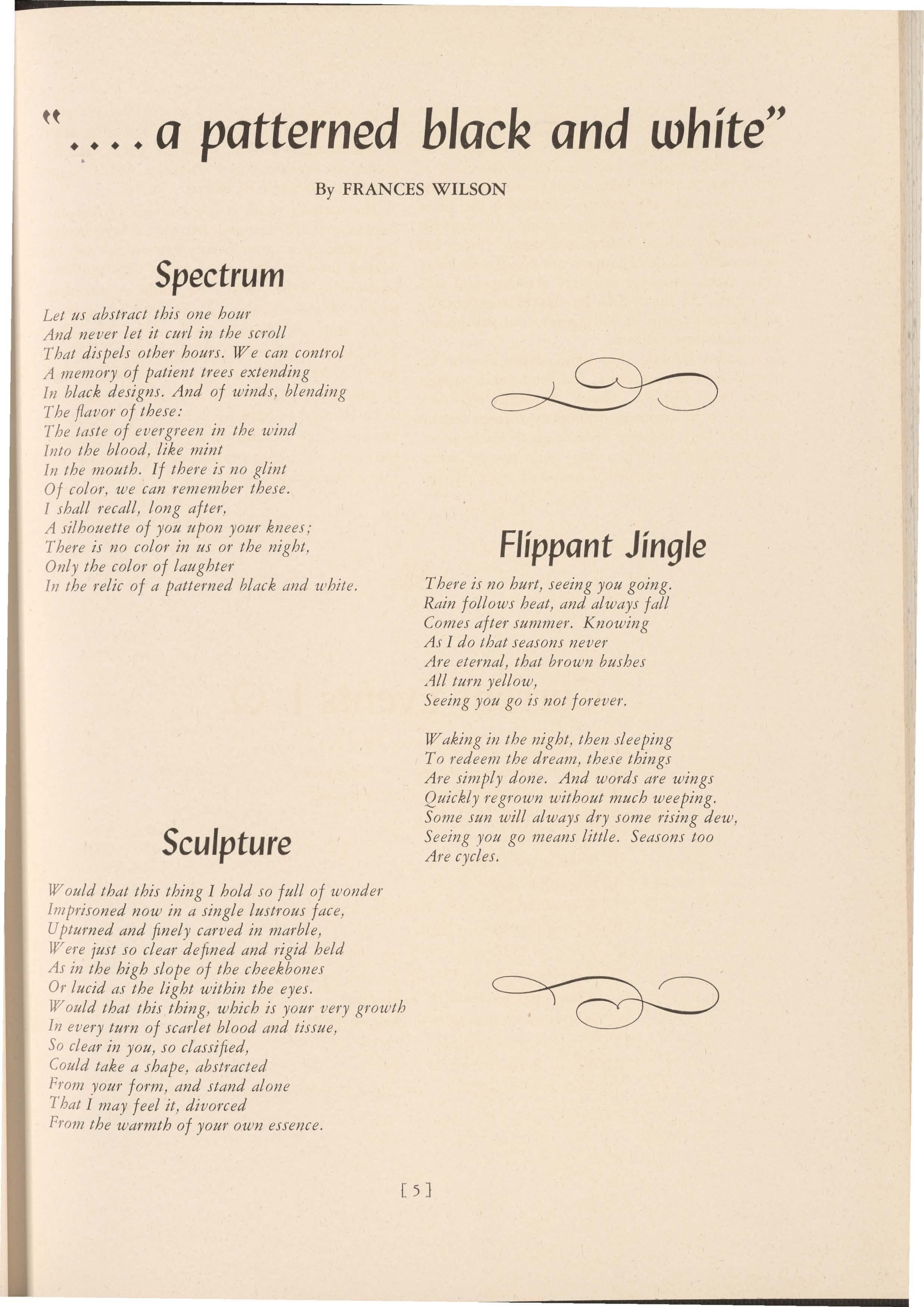
Wo uld that this thing I hold so full of wonder Impr isoned now in a single lustrous face , Upturned and finely carved in marble, We re just so clear defined and rigid held As in the high slope of the cheekbones Or lucid as the light within the eyes. Wo uld that this thing, which is your very growth In ev ery turn of scarlet bl ood and tissue , So clear in you, so classified, Could take a shape, abstracted From your form, and stand alone Tha t I may fee l it, divorced From the warmth of your own essence.
There is no hurt, seeing you going. Rain follows heat, and always fall Comes after summer. Knowing As I do that seasons never Are eternal, that brown bushes /1/l turn yellow, Seeing you go is not forever.
Waking in the night, then sleeping To redeem the dream, these things Are simply done And words are wings Quickly regrown without much weeping. Some sun will always dry some rising dew, Seeing _yougo means little. Seasons too Are cycles.
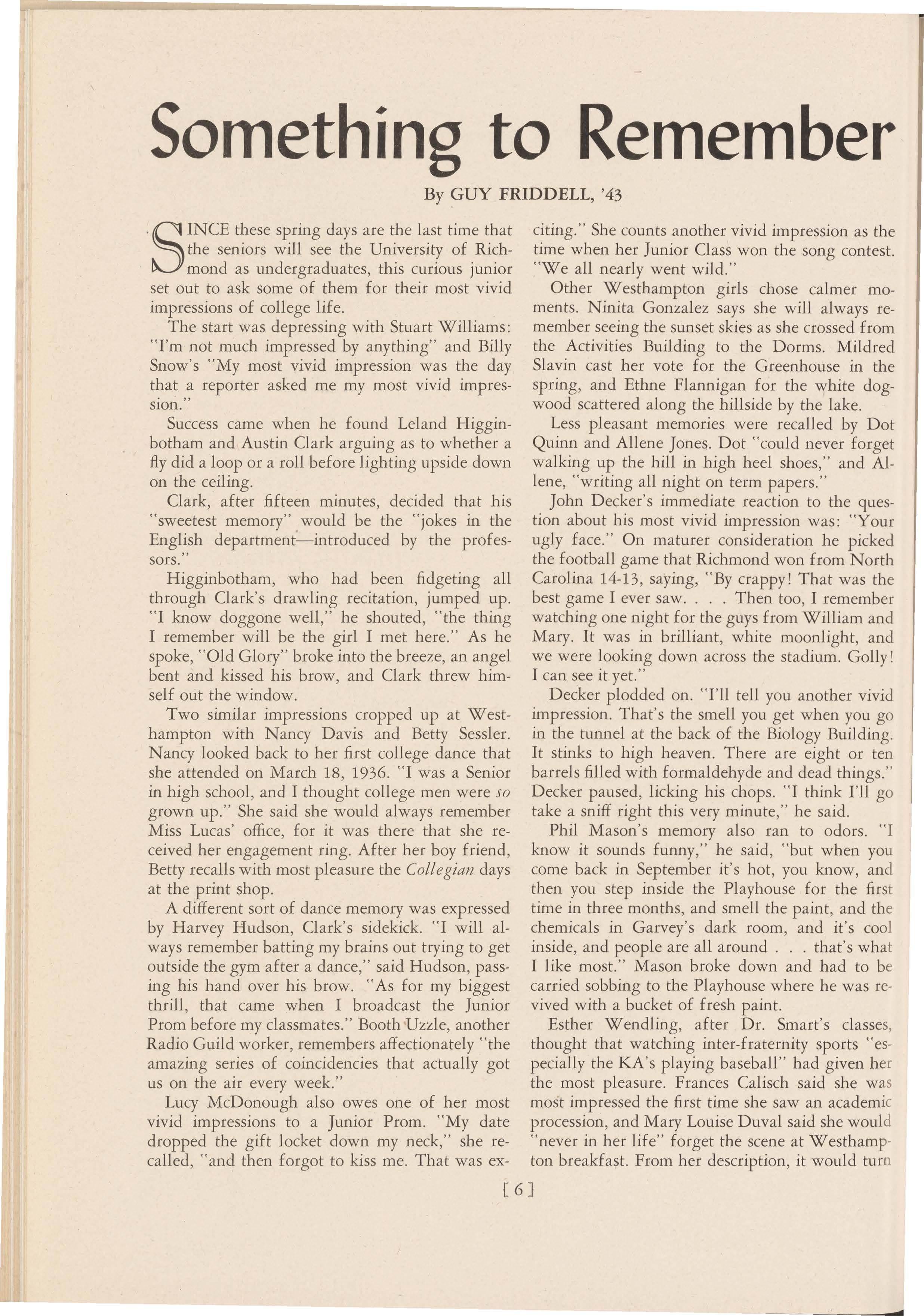
By GUY FRIDDELL, '43
INCE these spring days are the last time that the seniors will see the University of Richmond as undergraduates, this curious junior set out to ask some of them for their most vivid impressions of college life.
The start was depressing with Stuart Williams: 'Tm not much impressed by anything" and Billy Snow's "My most vivid impression was the day that a reporter asked me my most vivid impression."
Success came when he found Leland Higginbotham and Austin Clark arguing as to whether a fly did a loop or a roll before lighting upside down on the ceiling.
Clark, after fifteen minutes, decided that his "sweetest memory" would be the "jokes in the English department-introduced by the prof essors."
Higginbotham, who had been fidgeting all through Clark's drawling recitation, jumped up. "I know doggone well," he shouted, "the thing I remember will be the girl I met here." As he spoke, "Old Glory" broke into the breeze, an angel bent and kissed his brow, and Clark threw himself out the window.
Two similar impressions cropped up at Westhampton with Nancy Davis and Betty Sessler. Nancy looked back to her first college dance that she attended on March 18, 1936. "I was a Senior in high school, and I thought college men were so grown up." She said she would always remember Miss Lucas' office, for it was there that she received her engagement ring. After her boy friend, Betty recalls with most pleasure the Collegian days at the print shop.
A different sort of dance memory was expressed by Harvey Hudson, Clark's sidekick. "I will always remember batting my brains out trying to get outside the gym after a dance," said Hudson, passing his hand over his brow. "As for my biggest thrill, that came when I broadcast the Junior Prom before my classmates." Booth Uzzle, another Radio Guild worker, remembers affectionately "the amazing series of coincidencies that actually got us on the air every week."
Lucy McDonough also owes one of her most vivid impressions to a Junior Prom. "My date dropped the gift locket down my neck," she recalled, "and then forgot to kiss me. That was ex-
citing." She counts another vivid impression as the time when her Junior Class won the song contest. "We all nearly went wild."
Other Westhampton girls chose calmer moments. Ninita Gonzalez says she will always remember seeing the sunset skies as she crossed from the Activities Building to the Dorms. Mildred Slavin cast her vote for the Greenhouse in the spring, and Ethne Flannigan for the white dogwood scattered along the hillside by the lake.
Less pleasant memories were recalled by Dot Quinn and Allene Jones. Dot "could never forget walking up the hill in high heel shoes," and Allene, "writing all night on term papers."
John Decker's immediate reaction to the question about his most vivid impression was: "Your ugly face." On maturer consideration he picked the football game that Richmond won from North Carolina 14-13, saying, "By crappy! That was the best game I ever saw .... Then too, I remember watching one night for the guys from William and Mary. It was in brilliant, white moonlight, and we were looking down across the stadium. Golly! I can see it yet."
Decker plodded on. 'Tll tell you another vivid impression. That's the smell you get when you go in the tunnel at the back of the Biology Building. It stinks to high heaven. Tl;:iere are eight or ten barrels filled with formaldehyde and dead things." Decker paused, licking his chops. "I think I'll go take a sniff right this very minute," he said.
Phil Mason's memory also ran to odors. "I know it sounds funny," he said, "but when you come back in September it's hot, you know, and then you step inside the Playhouse for the first time in three months, and smell the paint, and the chemicals in Garvey's dark room, and it's cool inside, and people are all around that's wha t I like most." Mason broke down and had to b e carried sobbing to the Playhouse where he was revived with a bucket of fresh paint.
Esther Wendling, after Dr. Smart' s classes, thought that watching inter-fraternity sports "especially the KA's playing baseball" had given he r the most pleasure. Frances Calisch said she wa s most impressed the first time she saw an academi c procession, and Mary Louise Duval said she woul d "never in her life" forget the scene at W esthampton breakfast. From her description, it would turn
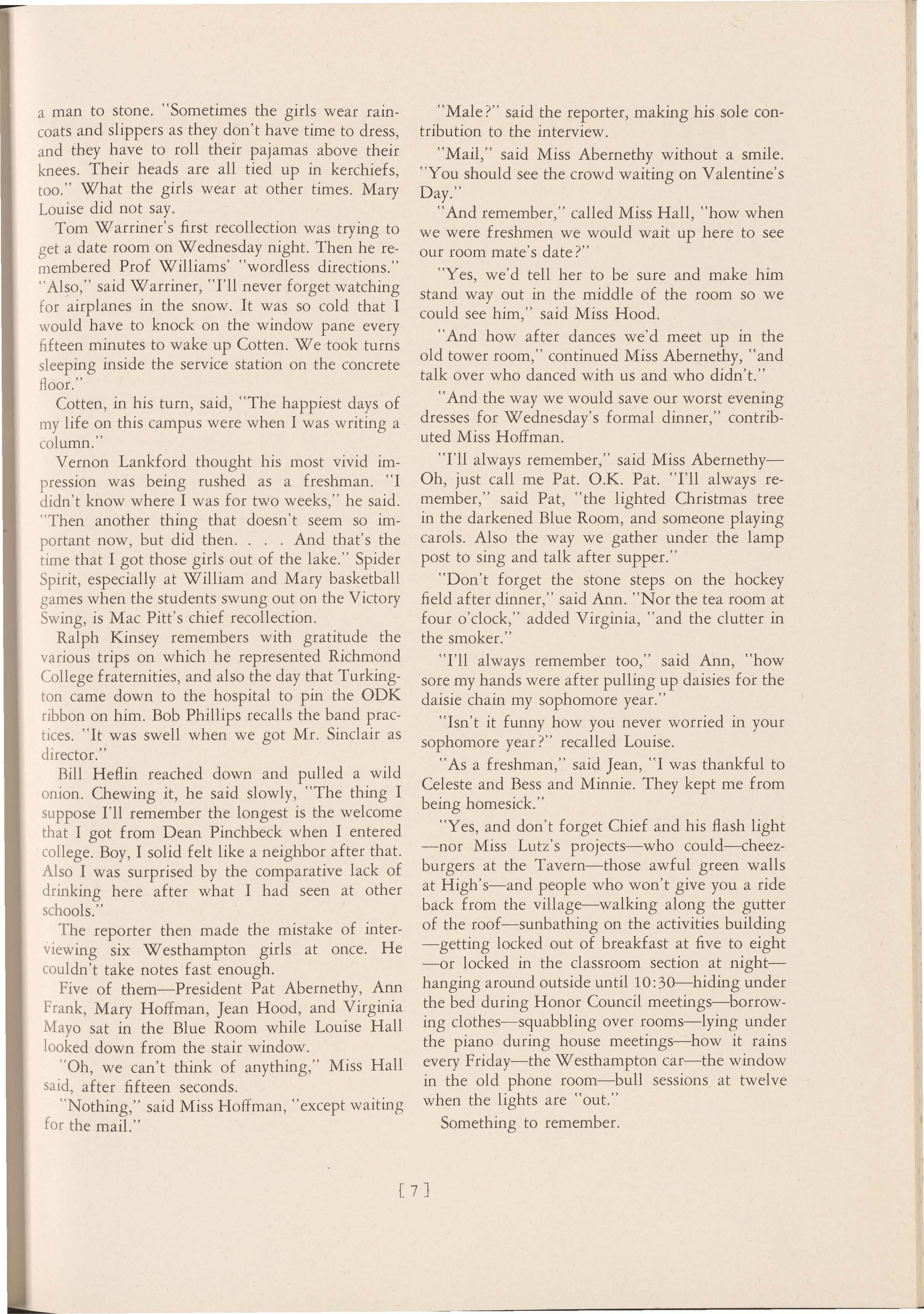
a man to stone. "Sometimes the girls wear raincoats and slippers as they don't have time to dress, and they have to roll their pajamas above their knees . Their heads are all tied up in kerchiefs , too. " What the girls wear at other times. Mary Louise did not say
Tom Warriner's first recollection was trying to g et a date room on Wednesday night. Then he remembered Prof Williams ' "wordless directions." "A l?o," said Warriner , 'Tll never forget watching fo r airplanes in the snow . It was so cold that I would have to knock on the window pane every fif teen minutes to wake up Cotten . We took turns sleeping inside the service station on the concrete .floor."
Cotten , in his turn , said , "The happiest days of my life on this campus were when I was writing a column. "
Vernon Lankford thought his most vivid impr ession was being rushed as a freshman "I didn ' t know where I was for two weeks ," he said. " T hen another thing that doesn ' t seem so impor tant now , but did then . . . . And that's the time that I got those girls out of the lake " Spider Spirit, especially at William and Mary basketball ga mes when the students swung out on the Victory Swing, is Mac Pitt ' s chief recollection
R alph Kinsey remembers with gratitude the va rious trips on which he represented Richmond Colleg e fraternities , and also the day that Turkington came down to the hospital to pin the ODK ribbon on him . Bob Phillips recalls the band practices. "It was swell when we got Mr. Sincla ir as director. "
Bill Heflin reached down and pulled a wild onion. Chewing it , he said slowly , "The thing I supp o se I'll remember the longest is the welcome tha t I got from Dean Pinchbeck when I entered colleg e. Boy, I solid felt like a neighbor after that. Also I was surprised by the comparative lack of drinking here after what I had seen at other schools. "
T he reporter then made the mistake of interviewing six Westhampton girls at once. He couldn ' t take notes fast enough
Five of them - President Pat Abernethy , Ann Fran k , Mary Hoffman, Jean Hood, and Virginia Mayo sat in the Blue Room while Louise Hall looked down from the stair window .
" O h , we can't think of anything ," Miss Hall said , after fifteen seconds
" N othing," sa id Miss Hoffman , "except waiting for the mail. "
"Male ?" said the reporter, making his sole contribution to the interview.
"Mail ," said Miss Abernethy without a smile . " You should see the crowd waiting on Valentine's Day."
"And remember," called Miss Hall, "how when we were freshmen we would wait up here to see our room mate ' s date?"
"Yes , we'd tell her to be sure and make him stand way out in the middle of the room so we could see him," said Miss Hood.
" And how after dances we'd meet up in the old tower room, " continued Miss Abernethy, "and talk over who danced with us and who didn ' t."
"And the way we would save our worst evening dresses for Wednesday's formal dinner, " contributed Miss Hoffman.
'TU always remember," said Miss AbernethyOh , just call me Pat. O.K. Pat. ' Tll always remember ," said Pat , "the lighted Christmas tree in the darkened Blue Room, and someone playing carols Also the way we gather under the lamp post to sing and talk after supper. "
"Don ' t forget the stone steps on the hockey field after dinner, " said Ann . "Nor the tea room at four o'clock," added Virginia, "and the clutter in the smoker."
'Tll always remember too," said Ann, "how sore my hands were after pulling up daisies for the daisie chain my sophomore year ."
"Isn ' t it funny how you never worried in your sophomore year? " recalled Louise.
"As a freshman," said Jean, "I was thankful to Celeste and Bess and Minnie They kept me from being homesick ."
"Yes, and don't forget Chief and his .flash light - - nor Miss Lut z 's projects-who could-cheezburgers at the Tavern-those awful green walls at High ' s-and people who won ' t give you a ride back from the village-walking along the gutter of the roof-sunbathing on the activities building - getting locked out of breakfast at five to eight - or locked in the classroom section at nighthanging around outside until 10: 30-hiding under the bed during Honor Council meetings-borrowing clothes - squabbling over rooms-lying under the piano during house meetings-how it rains every Friday-the Westhampton car-the window in the old phone room-bull sessions at twelve when the lights are "out. "
Something to remember.
THIS SUBJECT - "Religion as the Basis of a New World Order" - has been chosen by the Philosophy-and-Religion Department of Westhampton College, because it sums up-better than any other, we think-the trend of interest and discussion among students during the last year. Long before America's entrance into the war, students were asking WHY this war had happened, WHO had been responsible , and WHAT the thinking people of the world could do to insure its not happening again. Since America's formal entrance into war, last December, their problems have become more real and their questions more searching. The war has been brought home with a bang-a ba ng that has shaken all of us, made us readjust our lives and reexamine our values
But above and beyond all private concerns, American students are beginning to realize that the period through which the world is passing now is perhaps the most revolutionary of man's entire history - that the old order is yielding place to new m ore rapidly and over a broader reach of earth's surface than at any previous period in human history What will be the shape of things to come-and what kind of world w ill this titanic conflict usher in? These are the questions which thoughtful students are beg inning to ask And they are not willing for their questions to go unanswered. Their college courses have acquainted them with a l ong history of power politics, personal greeds, r acial antagonisms , and wars - as futile as they were ghastly . A long and sorrowful history of human stupidity. Ag ain a generation of youth is a sked to offer its life to preserve the status quo. But this time an informed and clear-thinking youth demands a definition of that status-quo, demands that the peace for which it fights be a just and lasting peace, built on eternal and universal values - a nd N OT just the rationali zed morality of selfseeking emperialism or blind nationalism The question , then, arises as to what kind of peace will be a jus t and l astin g peace. Students have not been inarticulate on that score. What would you say, Miss Calisch , has been the opinion of students concerning the nature of the peace which they want after this w a r ?
Cct!isch-Well , we cert a inly don ' t want another peace like the last one-just a temporary halting of war until forces can be collected for
*This script pr e par ed by Dr M a rtha B. Luca s w a s broadca s t ove r St a ti o n WR N L, M ay 2 0, 1942.
wholesale murder of the n ext generation. We want to remove the CAUSES of war-the economic inequality - the social inequality-the false doctrines of racial and national superiority
Dr. Lucas-Would you agree then, Calisch , that what you are recommending as a truly victorious peace will be the reorganization of the world on a genuinely DEMOCRATC basis?
Calisch-Yes, I suppose I would. We certainly aren't fighting to preserve anybody ' s empireor any nation's right to rule over and exploit th e resources of any other nation. We want equal rights for all nations and for all men of all nations , and a fair distribution of the world' s natural resources.
D r Luc as-That would seem to be a fair statement of our war aims, Calisch-but what of our peace aims or , more exactly , our attempts at peac e aims? What kind of machinery will we have t o set in motion when the armistice whistles star t blowing this time? How are we going to g et equality for all nations, the vanquished as we ll as the victorious? What sort of people-wh at sort of organi zations can we trust with this mo st vital of all missions-that of insuring a just an d lasting peace? Would you say the historians ar e best qualified - or the politicians - or the sociologists?
Calisch-Well, from our study of religion th is year, I should say that the people working in the field of religion are the ones who seem mo st actively concerned at present with the problem s of a lasting peace. In fact, all through our stu dy of the development of the leading religions in the world I have been surprised to see how dee ply many religious leaders have been concerne d with reforming the world , in bringing unity an d peace to the world through some new religio us concept. Today that idea of working to promo te the "Kingdom of God, " as they call it , seems central in Christian teachings .
Dr. Luc cts-Yes, that concept of the " Kingdom of God" has certainly been fundamental in the d evelopment of Jewish and Christian thought. Of course, the idea of a unified world under one religion has not been confined to the Jude oChristian tradition. The Japanese, for exampl e, have developed a similar view, based upon th eir conviction that only THEIR culture and TH EIR religious teachings can bring salvation to t he

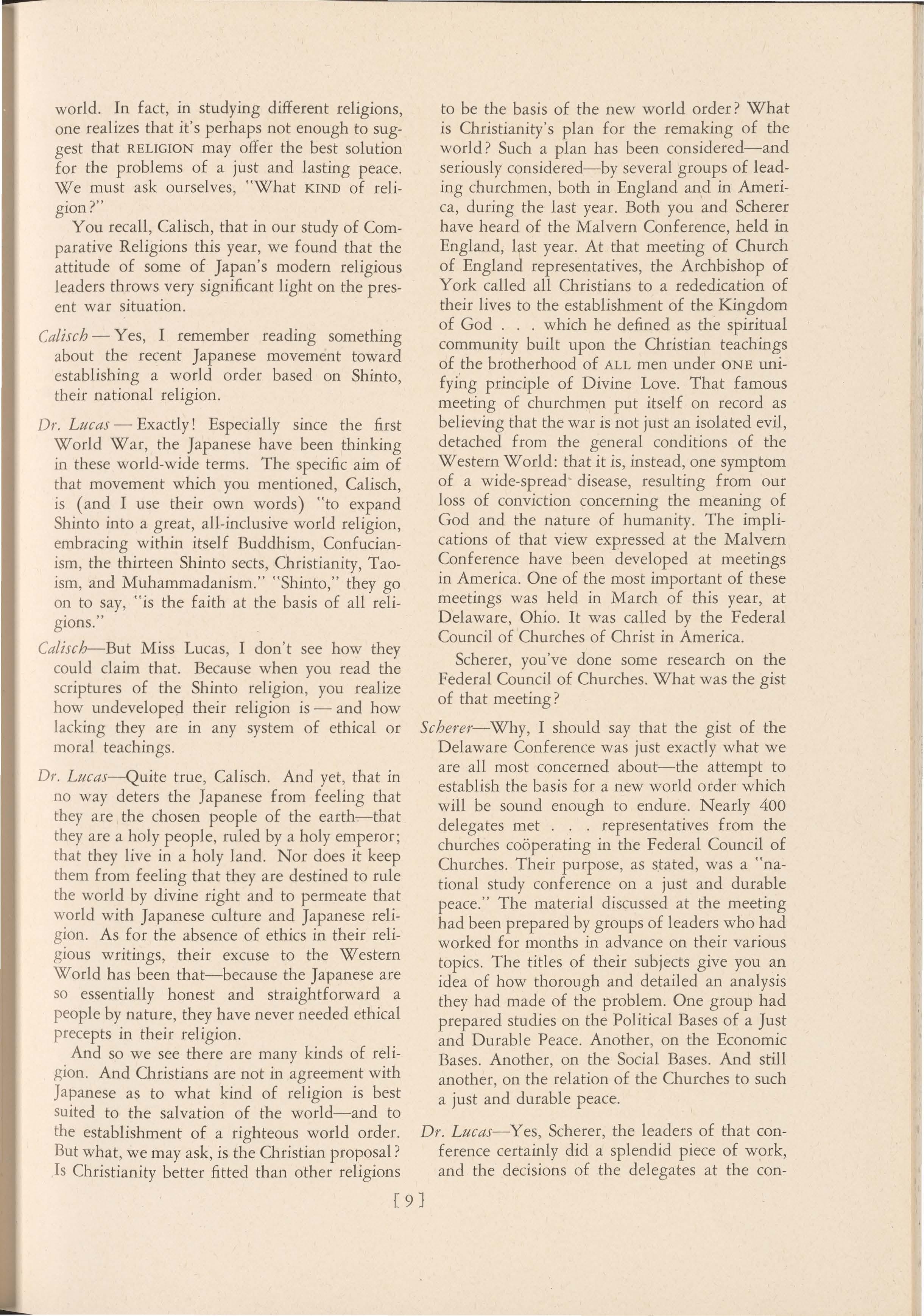
world. In fact, in studying different religions, one realizes that it's perhaps not enough to suggest that RELIGION may offer the best solution for the problems of a just and lasting peace. We must ask ourselves, "What KIND of religion?"
You recall, Calisch, that in our study of Comparative Religions this year, we found that the attitude of some of Japan's modern religious leaders throws very significant light on the present war situation.
Cal isch - Yes, I remember reading something about the recent Japanese movement toward establishing a world order based on Shinto, their national religion.
Dr. L u cas - Exactly! Especially since the first World War, the Japanese have been thinking in these world-wide terms. The specific aim of that movement which you mentioned, Calisch, is ( and I use their own words) "to expand Shinto into a great, all-inclusive world religion , embracing within itself Buddhism, Confucianism, the thirteen Shinto sects, Christianity, Taoism, and Muhammadanism." "Shinto, " they go on to say, "is the faith at the basis of all relig ions ."
Calisch- But Miss Lucas , I don ' t see how they could claim that. Because when you read the scriptures of the Shinto religion , you realize how undeveloped their religion is - and how lacking they are in any system of ethical or moral teachings .
Dr Lucas- Quite true, Calisch And yet , that in no way deters the Japanese from feeling that th ey are the chosen people of the earth-that the y are a holy people, ruled by a holy emperor; that they live in a holy land. Nor does it keep th em from feeling that they are destined to rule the world by divine right and to permeate that wor ld with Japanese culture and Japanese religion. As for the absence of ethics in their religious writings, their excuse to the Western W orld has been that-because the Japanese are so essentially honest and straightforward a people by nature , they have never needed ethical pr ecepts in their religion
And so we see there are many kinds of religion. And Christians are not in agreement with Ja panese as to what kind of religion is best suited to the salvation of the world-and to th e establishment of a righteous world order. But what , we may ask, is the Christian proposal? Is Christianity better fitted than other religions
to be the basis of the new world order? What is Christianity ' s plan for the remaking of the world? Such a plan has been considered-and seriously considered - by several groups of leading churchmen, both in England an,d in America, during the last year. Both you and Scherer have heard of the Malvern Conference , held in England , last year. At that meeting of Church of England representatives, the Archbishop of York called all Christians to a rededication of their lives to the establishment of the Kingdom of God . . . which he defined as the spiritual community built upon the Christian teachings of the brotherhood of ALL men under ONE unifying principle of Divine Love. That famous meeting of churchmen put itself on record as believing that the war is not just an isolated evil, detached from the general conditions of the Western World : that it is , instead, one symptom of a wide-spread · disease , resulting from our loss of conviction concerning the meaning of God and the nature of humanity. The implications of that view expressed at the Malvern Conference have been developed at meetings in America One of the most important of these meetings was held in March of this year, at Delaware, Ohio. It was called by the Federal Council of Churches of Christ in America.
Scherer , you've done some research on the Federal Council of Churches What was the gist of that meeting?
Scherer-Why, I should say that the gist of the Delaware Conference was just exactly what we are all most concerned about-the attempt to establish the basis for a new world order which will be sound enough to endure . Nearly 400 delegates met representatives from the churches cooperating in the Federal Council of Churches. Their purpose , as stated, was a "nation a l study con£erence on a just and durable peace. " The material discussed at the meeting had been prepared by groups of leaders who had worked for months in advance on their various topics. The titles of their subjects give you an idea of how thorough and detailed an analysis they had made of the problem. One group had prepared studies on the Political Bases of a Just and Durable Peace Another , on the Economic Bases Another, on the Socia l Bases. And still another, on the relation of the Churches to such a just and durable peace.
Dr. Lucas- Yes, Scherer, the leaders of that conference certainly did a splendid piece of work, and the decisions of the delegates at the con-
ference are most challenging. Could you give us an idea, Scherer, of the main points presented by those American church leaders?
Scherer-Well, the conference stressed first of all the Christian Church's obligation to take a leading part in the final peace and in the making of the post-war world. They believe that the Christian Church has a special contribution to make to peace because it is, as they put it, "the trustee of certain principles without which peace is impossible." These principles they sum up as the moral law-that law which is just as fundamental and eternal in the world as is physical law-and a vitally essential part of man's nature. If man is to escape chaos and recurrent war, his social and political institutions must be made to conform to this moral order.
Dr. Lucas-How would you define that law, Scherer?
Scherer-I should say, Miss Lucas, that it's what Jesus meant when he said we must love our neighbors as ourselves, and treat others as we would have them treat us. And I suppose it's what Paul meant when he told the Ephesians that "We are members one of another."
Dr. Lucas-Yes, Scherer, that teaching has been central to the Christian tradition. It was given perhaps its most sublime expression in the gospel of John, where God is interpreted as eternal Love at work in the universe. And of course, the most famous formulation of that law in the · history of modern Christian philosophy is the so-called Categorical Imperative of Immanuel Kant.
But just how, Scherer, did the leaders of the Delaware Conference propose to regulate the post-war world according to this moral law?
Scherer-I have a pamphlet with me here, Miss Lucas, which sums up the decisions of the conference. I notice that the authors are quite specific in their application of this Christian principle to the post-war situation. For instance, they say here-with regard to any kind of "punishment" of our enemies after the war:
"We believe that it is contrary to the moral order that nations in their dealings with one another should be motivated by a spirit of revenge and retaliation. Such attitudes will lead, as they always have led, to renewed conflict."
And then, later, concerning the kind of world order to be established by the next peace conference, The American Church leaders say this:
"We believe that the principle of coopera-
tion and mutual concern, implicit in the moral order and essential to a just and durab l e peace, calls for a true community of nations. The interdependent life of nations must be ordered by agencies having the duty and the power to promote and safeguard the general welfare of all peoples. Only thus can wrongs be righted and justice and security achieved."
Dr. Lucas-Yes, they seem to take a firm stand there for something resembling an armed league of nations whose duty it would be to safe guard the rights and harmonize the differences of all individual member-nations of that international community. How about the economic basis of such a new world order-What point do they make there, Scherer?
Scherer-Here again the Church leaders are quite specific in their statement:
"We believe," they write, "that economic security is no less essential than political security to a just and durable peace. Such security nationally and internationally involves among other things the use of material resources and the tools of production to raise the general standard of living. Nations are not economically self-sufficient, and the natural wealth of the world is not evenly distributed." And then they go on to say that natural resources can no longer be looked upon as the private property of individual persons or of individual nations-but that the world's natural resources are a sacred trust to be distributed equally among all.
Dr . Lucas-Yes, and if you'll note there, Scherer, the Federal Council of Churches makes very plain its belief that the United States has a great responsibility in bringing international relations into conformity with the moral law. Again and again, they insist that if the new world order is to be any improvement over the old, the United States MUST accept the responsibility for carrying out a constructive job in proportion to the greatness of its power and opportunity.
So much, then, for religion as the basis of a new world order. The leaders of the Christian religion feel that Christianity has a unique contribution to make to the world of tomorrow, and the indications are that the Christian world is getting down to business, determined that their principles shall not be betrayed at another socalled "Peace" table. The Christian men of good will today are making it clear to all that they intend to insure at the next Versailles that God's will may be done-and God's Kingdom come-on earth as it is in heaven.
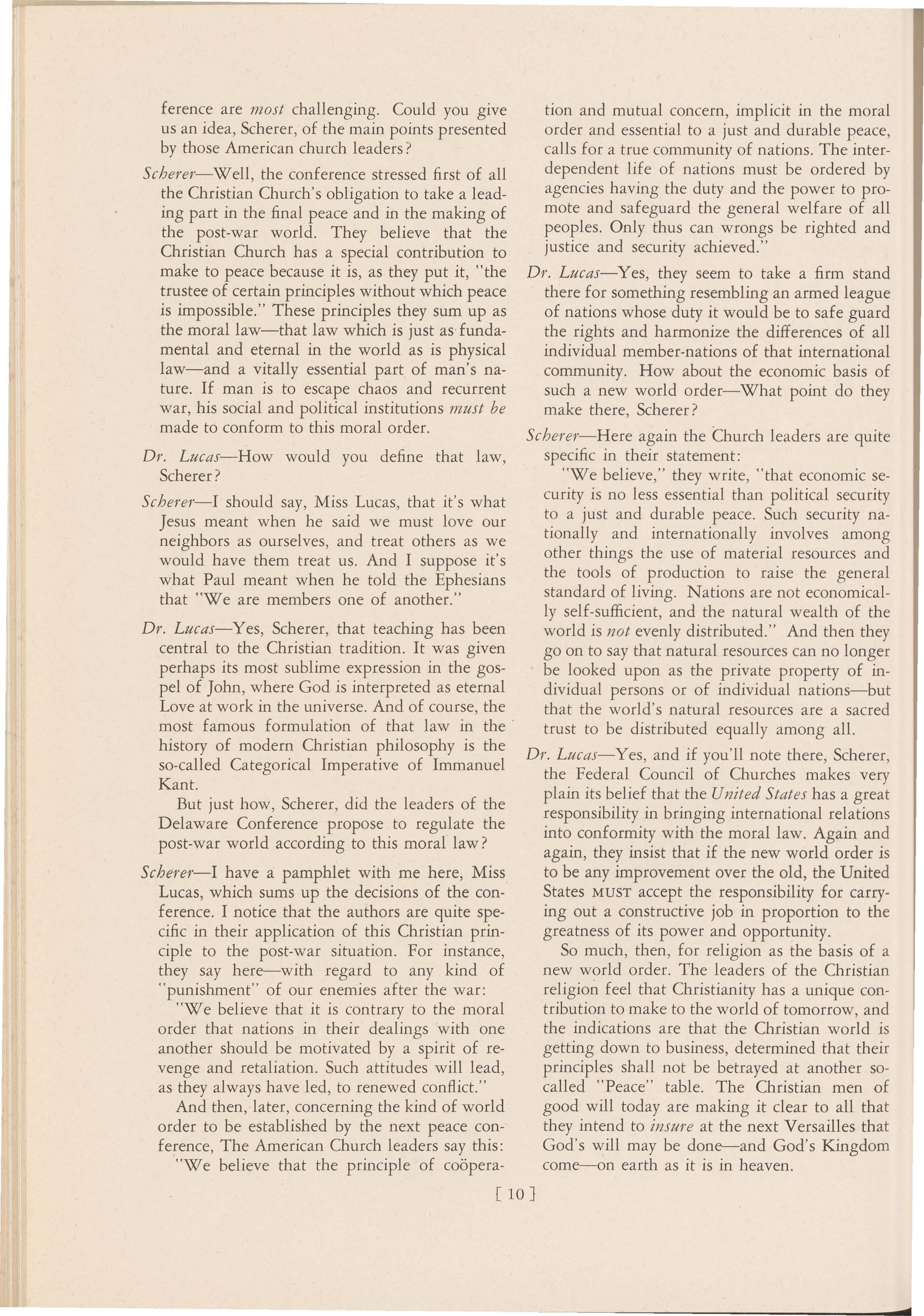
[ 10 J

By ALLI!TER MacKENZIE, '43
THE CLINICS were lots of fun, but just who auction. He sold everything from his brother to is crazy and who isn ' t? That is what Doctor the WRVA radio station. First he named the Astrop' s ·pupils who visited the mental hos " article, spelled it, pronounced the price and the pi tals at Williamsburg and Petersburg are wonder- word " sold " very promptly, then closed each sale ing. Perhaps you have noticed one of those stu- with a very solemn "amen." dents looking you over rather intently lately. Well Some of the inmates seemed to be just as crazy you can be almost certain that he is trying to re- for money as are people on the outside. One man member of which one of the types of inmates you enjoyed showing a coin trick. He took your coin, remind him. Everyone was impressed by the fact flipped it and asked you to call it. If you missed tha t he saw patients that greatly resembled some he put it in his pocket, if you called it right, he of his acquaintances. It was not the appearance said "That's right," and put it in his pocket anytha t always mattered but what the mentally af- way. Our visit proved very profitable to him and flicted said and did. Even their actions took us he gave us an annual pass to come back and see him back to people we knew outside. It was generally anytime. A former preacher was showing us some concluded by the students that they were going to of his handiwork and he also had a pretty good behave as sanely as possible in the future eye for money. He started his talk with the jingle,
The clinics afforded much food for thought. "If you want to make a preacher laugh, break The re were many pitiful cases and our sympathies a dollar and give him half." Then he asked cert a inly were aroused, but as Doctor Astrop had us to raise our hands if we thought the doctor pro phesied, we saw a show worth a dollar and ten ought not to give him a half a dollar. He put the cents in anybody ' s money The trip was made by doctor on the spot by concluding that since no trai n to Williamsburg while a bus supplied the hands were up we all agreed that the doctor should tran sportation to Petersburg . In each case upon fork over. As the preacher started showing us his our arrival we were permitted to look around the needlework , he notified us that he would gladly hospital and watch the inmates at their abnormal receive any contributions thrown on the stage at ways of living. Then we gathered in a lecture room the end of his lecture. He went on to describe the for the clinic. cloth designs with the first descriptive words that
The clinic at Petersburg was opened with the entered his mind. He would show us something negro glee club singing an old spiritual. It was he called a queen holding two gallons in her hand, even directed by one of the inmates. It seems that and then later he would tell us the design repremusicians and mathematicians are able to retain sented George Washington faced up with God the their skill upon going insane. A mathematical whiz Father. He closed his speech with a very biblical later stumped us with his tricks with figures. The invitation for money and picked up nearly a dollar clinic continued with the doctors showing us typi- and a half in change. Among the other dimentia cal cases of the various types of mental diseases. praecox parenoids, or people where money has Some of these patients took great delight in enter- gone to their heads, was the woman with three taining us. The only entrance qualification for hundred and twenty-eight million dollars who some of them must have been that they be continu- restored Williamsburg. She bemoaned the fact that ally happy. These manic depressives, as they are they did not even allow her to go out and look at it. technically known, put on a show at which only Then there were those who were fanatical about the other inmates were able to keep a straight face. religion. At the Williamsburg hospital a group of Even the most serious students broke down when men were singing hymns in the background while one of the inmates broke in on another that was a woman evangelist told us that if we did not reholding our attention and reminded us not to pay pent, "damn us, " we would go straight to hell. A any a ttention because the speaker was just "crazy colored woman at Petersburg came in and anas h ell." nounced that she was Jesus Christ and was going
T he clinic at Williamsburg was somewhat di- to marry the world. When asked what color she verted by a patient outside a window holding an was, she replied that she was white but was an [ 11 J
Indian turned brown because people had been giving her so much poison. These paranoids believe that people are continually harming them. One man was troubled by electrical connections people were causing in his head. This type is harmless, however, as long as the blame is not narrowed down to a single person.
Marriage seems to have its mental hazards also. We saw a married couple at the Petersburg hospital who had once been living a normal married life. The husband had first gotten a little unbalanced but continued living at home. Through the close association the wife soon became the same way. The husband is a graduate of Columbia University, but now he spends his time listening to angelic voices. This ought to make us think twice before we let Cupid draw us into anything. Among the other cases presented where love had had disasterous effects was a school teacher. She is an inmate now having previously suffered a severe love disappointment.
One man had the pleasure of talking to whomever he pleased over a special phone he had made. He contacted Roosevelt for us and informed us the President was not well because the country was in too bad a condition.
It seems that often the public has the wrong attitude toward the mentally sick. Over half the cases are being cured. They should be regarded the
same as any other sick people. Of course there are those who are doomed to remain in the hospitals permanently. Among those who cannot take care of themselves are the idiots who can not even dress themselves. There are also the seniles or normal old people whose brains have gotten so old that they do not function correctly. Others needing constant attention are the macrocephalics and the microcephalics. These are patients with heads several times too large or too small. The abnormal proportions are unbelievable and actually make the patient top heavy. It is not, as generally believed, however, that society needs to be protected from the mentally ill, but that they need to be protected from society. Of the nine hundred received yearly at the Petersburg hospital over five hundred are returned home. The object of the hospitals is to make these people come out of their shells and regain contact with the world. Life at the hospital includes work rooms, movies, weekly dances and a weekly newspaper. The respective types of religion are offered and found to be a great aid in stabilizing the patient.
Fear is the main cause of insanity. It is fear that tends to rule our lives. Only as we overcome our fears are we able to maintain our sanity. The mental patients are cured only as they are brought back to reality through the submergence of their fears.
For years I've yearned to find a scene, (It can't be done-a pity!)
Some picture in a magazine
Of one who wasn't pretty.
Some romance centered round a girl
An ordinary being,
Whose hair-just hair-would never curl
When she was asked a-teaing. A mortal-pale with freckled face
Whose dates were sadly lackingWho had no chance to dress in lace
Week-ends ne ' er found her packing, Won't some one please send out a wire?
Give dime-writers a hint! (Peculiar-isn't this desire
To see ONESELF in print.)
BETSY
RICE.

[ 12]
Ky afternoon that summer of 1952 observers at the Country Club could find the four perennials, Lucy Burke Allen, Annie Loie W alker, Harriet Howe, and Jean Grant Jackson sitting at their favorite bridge table, playing and gossiping, but mostly gossiping.
One afternoon the Westhampton College Alumnae Secretary, Virginia Mayo, was reading a book on a near-by divan. She put down her book to eavesdrop, and this is what she heard:
"Betty Ann Shack l eford's little girl came out with an I. Q. of 150 in her class yesterday. They p ut her into high school last week."
" Jayne Massie had another boy last month. Remember how proud of herself she was when she thought she was beating everybody else out of th e Baby Cup-and th en she had triplet -boys! And remember what a hard time Edmond had convincing her that she shouldn't call them George Edmond IV, V, and VI?"
" Rosalie Clary has been asked to speak at commencement at UR this year. Imagine being a Ph.D. in Latin , Philosophy, and Religion all at the same time. She has been elected Mortar Board national pr esident again this year. I hear she plans to visit every chapter personally. Now I know she will go crazy."
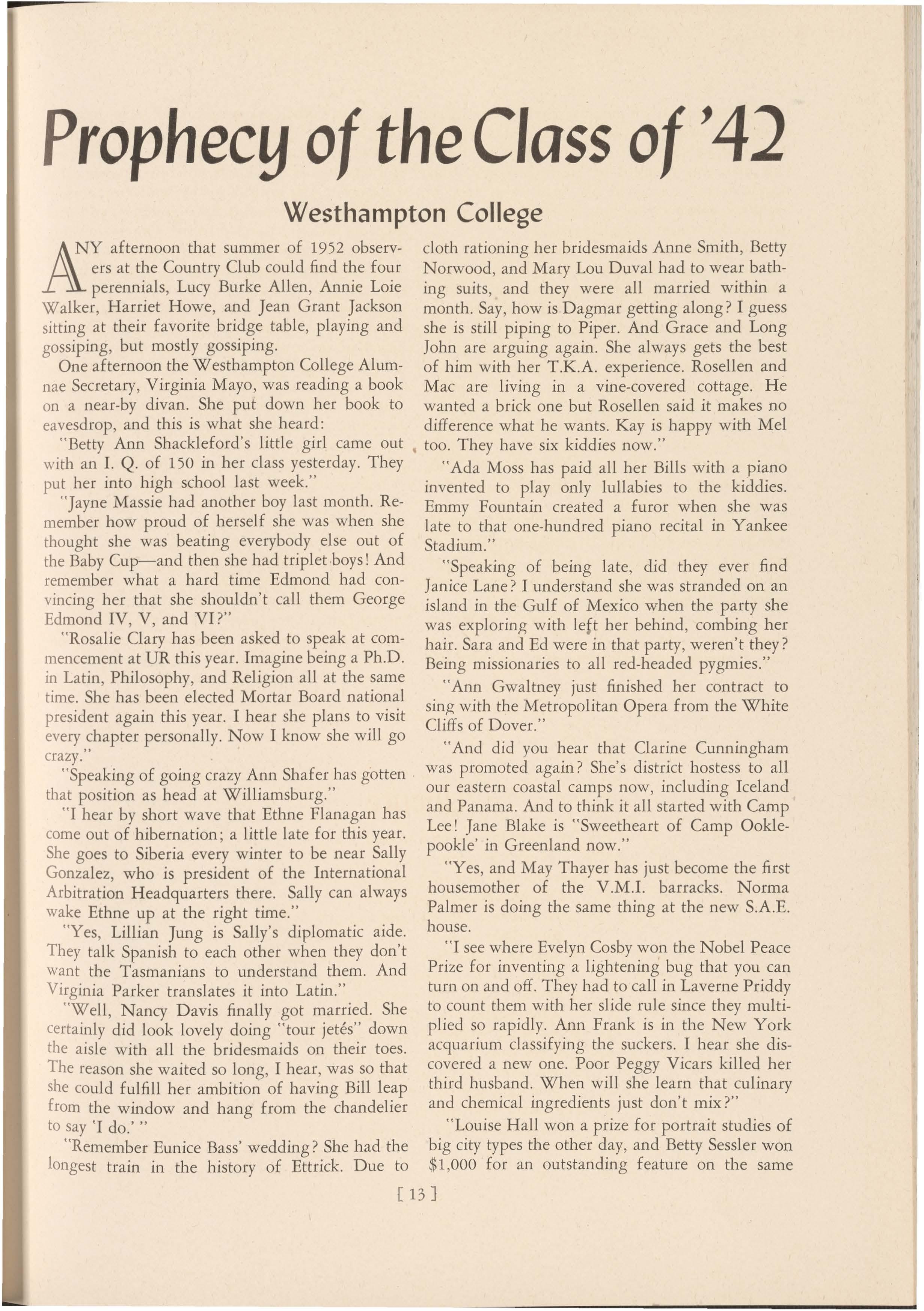
cloth rationing her bridesmaids Anne Smith, Betty Norwood , and Mary Lou Duval had to wear bathing suits, and they were all married within a month. Say, how is Dagmar getting along? I guess she is still piping to Piper. And Grace and Long John are arguing again. She always gets the best of him with her T.K.A. experience. Rosellen and Mac are living in a vine-covered cottage. He wanted a brick one but Rosellen said it makes no difference what he wants. Kay is happy with Mel too. They have six kiddies now."
"Ada Moss has paid all her Bills with a piano invented to play only lullabies to the kiddies. Emmy Fountain created a furor when she was late to that one-hundred piano recital in Yankee Stadium."
"Speaking of being late, did they ever find Janice Lane? I understand she was stranded on an island in the Gulf of Mexico when the party she was exploring with left her behind, combing her hair. Sara and Ed were in that party, weren't they? Being missionaries to all red-headed pygmies."
"Ann Gwaltney just finished her contract to sing with the Metropolitan Opera from the White Cliffs of Dover."
"And did you hear that Clarine Cunningham
" Speaking of going crazy Ann Shafer has gotten was promoted again? She's district hostess to all tha t position as head at Williamsburg." our eastern coastal camps now, including Iceland
" I hear by short wave that Ethne Flanagan has and Panama. And to think it all started with Camp come out of hibernation; a little late for this year. Lee! Jane Blake is "Sweetheart of Camp OokleShe goes to Siberia every winter to be near Sally pookle' in Greenland now." Gonzalez, who is president of the International "Yes, and May Thayer has just become the first Arbitration Headquarters there. Sally can always housemother of the V.M.I. barracks. Norma wake Ethne up at the right time." Palmer is doing the same thing at the new S.A.E.
" Yes, Lillian Jung is Sally's diplomatic aide. house. T hey talk Spanish to each other when they don't "I see where Evelyn Cosby won the Nobel Peace want the Tasmanians to understand them. And Prize for inventing a l ightening bug that you can Virg inia Parker translates it into Latin." turn on and off. They had to call in Laverne Priddy
"Well, Nancy Davis finally got married. She to count them with her slide rule since they multicertainly did look lovely doing "tour jetes" down plied so rapid ly. Ann Frank is in the New York the aisle with all the bridesmaids on their toes. acquarium classifying the suckers. I hear she disThe reason she waited so long, I hear, was so that covered a new one. Poor Peggy Vicars killed her she could fu l fill her ambition of having Bill leap third husband. When will she learn that culinary from the window an d hang from the chandelier and chemical ingredients just don't mix?" to say 'I do.' "
"Louise Hall won a prize for portrait studies of
" Remember Eunice Bass' wedding? She had the big city types the other day, and Betty Sessler won long est train in the history of Ettrick. Due to $1,000 for an outstanding feature on the same
[ 13}
thing. They coliaborated on the same subjects: Laura Jenkins, a cigarette girl at the Stork Club, as opposed to Allene Jones who went back home from her New York apartment to marry the home town boy."
"Speaking of creative arts, Lila Wicker has not only won the Prix de Paris five times in a row, but now she makes them up. Lucy McDonough has just won the Pulitzer Prize for her novel, "The Vienese Grapes or May Madness. Ellen Glasgow almost challenged her to a dual. Dorothy Hall and Esther Wendling are collaborating on Vogue specialities. D. thinks them up and Wendy sews them up."
"I saw poor Bad the other day. She is still taking those vitamin pills to make her more solid and dependable. Alice Gray Simpson comes up once in a while to give her a chiropractical going over. They reminisce over Gene Woodfin, who is teaching swimming to Hawaiian pearl divers."
"And by the way, the F B.I. finally got Mary Hoffman. Betty MacMurtry drove the prison truck She organized a whole prison bus brigade. Old Sing Song has a wonderful social program now. Evelyn McAuley does puppets every morning there at 5: 4 5. Peck Peters is chief wardness; and she lee-
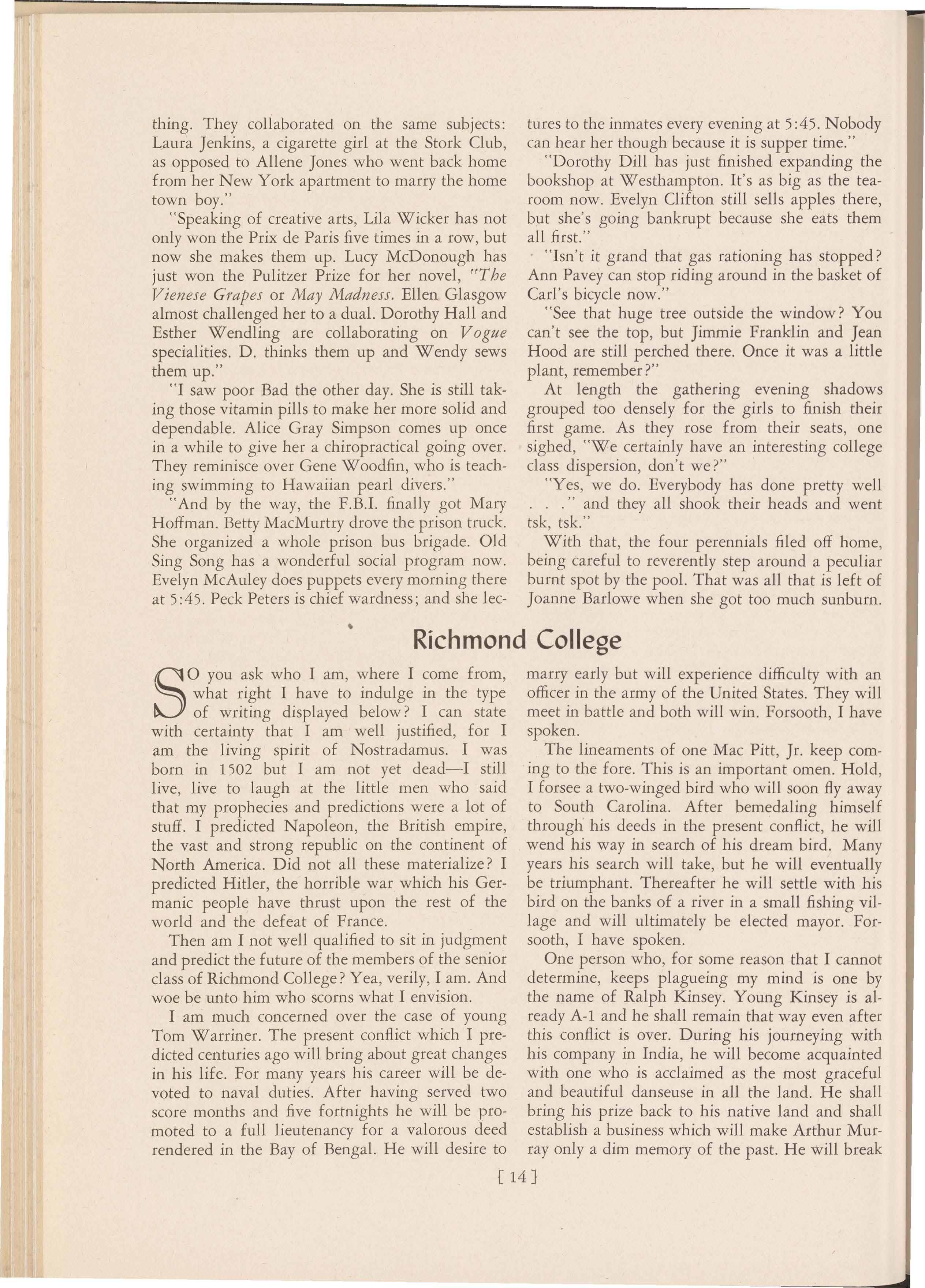
Stures to the inmates every evening at 5:45. Nobody can hear her though because it is supper time."
"Dorothy Dill has just finished expanding the bookshop at Westhampton. It's as big as the tearoom now. Evelyn Clifton still sells apples there, but she ' s going bankrupt because she eats them all first."
"Isn't it grand that gas rationing has stopped? Ann Pavey can stop riding around in the basket of Carl's bicycle now "
"See that huge tree outside the window? You can't see the top, but Jimmie Franklin and Jean Hood are still perched there. Once it was a little plant, remember?"
At length the gathering evening shadows grouped too densely for the girls to finish their first game. As they rose from their seats, one sighed, "We certainly have an interesting college class dispersion, don ' t we?"
"Yes, we do. Everybody has done pretty well . . . " and they all shook their heads and went tsk, tsk. "
With that, the four perennials filed off home , being careful to reverently step around a peculiar burnt spot by the pool. That was all that is left of Joanne Barlowe when she got too much sunburn.
O you ask who I am, where I come from, marry early but will experience difficulty with an what right I have to indulge in the type officer in the army of the United States. They will of writing displayed below? I can state meet in battle and both will win. Forsooth, I have with certainty that I am well justified , for I spoken. am the living spirit of Nostradamus. I was The lineaments of one Mac Pitt, Jr. keep comborn in 1502 but I am not yet dead- -! still ing to the fore. This is an important omen . Hold , live, live to laugh at the little men who said I forsee a two-winged bird who will soon fly away that my prophecies and predictions were a lot of to South Carolina. After bemedaling himself stuff. I predicted Napoleon, the British empire, through his deeds in the present conflict, he will the vast and strong republic on the continent of wend his way in search of his dream bird. Many North America. Did not all these materialize? I years his search will take, but he will eventually predicted Hitler, the horrible war which his Ger- be triumphant. Thereafter he will settle with his manic people have thrust upon the rest of the bird on the banks of a river in a small fishing vilworld and the defeat of France. lage and will ultimately be elected mayor. ForThen am I not well qualified to sit in judgment sooth, I have spoken. and predict the future of the members of the senior One person who, for some reason that I cannot class of Richmond College? Yea, verily, I am. And determine, keeps plagueing my mind is one by woe be unto him who scorns what I envision the name of Ralph Kinsey. Young Kinsey is all am much concerned over the case of young ready A-1 and he shall remain that way even after Tom Warriner. The present conflict which I pre- this conflict is over. During his journeying with dieted centuries ago will bring about great changes his company in India, he will become acquainted in his life. For many years his career will be de- with one who is acclaimed as the most graceful voted to naval duties. After having served two and beautiful danseuse in all the land. He shall score months and five fortnights he will be pro- bring his prize back to his native land and shall moted to a full lieutenancy for a valorous deed establish a business which will make Arthur Murrendered in the Bay of Bengal. He will desire to ray only a dim memory of the past. He will break [ 14]
all records at the Paramount. Then people will say, "Ralph Kinsey taught me dancing in a whimsey." Forsooth, I have spoken.
I must not fail to consider the case of one n amed Skee Goode. Goode will become one of the best pilots in the airforce of the United States. But mishap will befall him. The one who dearly loves him shall stow away in his thunderbird and a forced landing shall be necessitated on a small t ropical island called Pago-Bellie. There after m any years of hardship, they shall be picked up by a tramp steamer and returned to the great city. Pickings shall be lean until Goode ' s great book, "Life on Pago-Bellie" shall sell a million copies. Forsooth, I have spoken.
The case of one Bob Cotten intrigues me After en valoring himself in the navy of his country, he will go to a free port on the continent and shall experience difficulty with the Irish. However, the Ir ish shall not prevail and he will walk off with th e miss. He shall be sent to represent his country in Central Congo where a tsk-tsk fly shall bite him and inflict him with sleeping sickness. But he will need a rest anyhow and all will be well. His desires to become a writer had early been thwarted. Forsooth, I have spoken.
I feel compelled to speak of one Vernon Lankfor d. I predict that he shall return to his birthplace and become a Baptist preacher. Troublesome will be his trials, but his orating shall rival Demosthenes. Wedlock for him shall be long delayed. Forsooth , I have spoken.
About Lee Saunders? I predict he shall find his mate by peeking through a hole in his front yard fence and seeing her on the other side . His way shall be long, but he will soon become president of one of the largest ham factories in the world. Forsooth, I have spoken.

My mind reveals to me the features of one named Doug Laird. Ah, what of him? Behold, he is a wise man, for, whether he knows it or not, he is already practicing for his future career. In time he shall win the six-day bicycle race in the fastest time ever recorded. He shall even win over V erterlio di Virterlio di Vert, the great Armenian cyclist. Forsooth, I have spoken.
The name of Bob Black comes to my attention. I see that he shall be a soldier of fortune ·and ·shall be intrigued by a cute little French miss, but, lo, he shall overcome temptation and return to Harrisonburg, where he shall become chief warden at the female institution there. Forsooth, I have spoken.
I sometimes wonder about one under the appellation of Bert Milling. In later life he will return to Mobile where he shall raise cain. He will sell this long and short on the stock market and make a good-sized fortune. Therefore h~ will continue to raise cain the rest of his life. Forsooth, I have spoken.
I am confounded by the future of one called Archie Giragosian. Archie will be sent as an interpretor to French West Africa where he shall meet a Sudanese miss and all of a sudan he shall become attached. Archie will take with him one called Donald Robertson to be interpretor between him and his frau. Forsooth, I have spoken.
Then there comes the question of one Sonny Wholey. Sonny shall become the hottest second baseman in the American league. His batting ?verage shall be two times four times his present ~·rerage divided by three. And that's pretty good. Forsooth, I have spoken.
And concerning the senior class as a whole, I predict success and wish them well. Forsooth, I have spoken.
War is a quick and killing snowstorm, that buries grass in its wake
Like a battle a village, like a long campaign perhaps a civilization; War is the culmination of the misdeeds of men, To which we have closed our eyes, saying, if we look not on them, tl~ey will go away.
But we are given these eyes not just for beauty, We must see even moreObserve the fallen city, and the dying, And the land's white desolation; Realize how small the harvest,
A blackened bit of stubble under snowWeep not for spring, though she be late in coming And enter coldly, hesitant and slow;
For life has brought us an unhappy challenge: Beauty no longer meets the outward eye, And we must sleep to see it-or, if waking, Watch stricken beauty die; We must be active, sacrifice, aspire, Let all old standards go, And, leaving the past behind without regretting, Go forth to the land once more, build, make things grow.

If I touch a star, It is only stoneBeauty is the far Worshipful unknown.
Love is crystal, jade \)?hen below the seaDive: the colors fade, Somber fantasy.
What potent anguish a remark can make, Your presence by, your absence from my sideFire with no oxygen, till the breath break And strongest lungs are gray and terrified; So to this dusky death you send my heart, That flees, bewildered, closer to the flame Until the smoky rivers tear apart, The blood grows cool, the pulse is smothered, tame.
Only in ashes can this artery
Complete its tortured and ecstatic life ,
Since you know not the sure result for me Of seeing you, of speaking: like a knife Silver and shining, thrust your every wordI never answered-but I always heard.
Through vivid paths of memory I walk, Recalling you, remembering the spring A year ago, and all our casual talk, Your voice, a wistful cadence-everything.
Yet now I have no courage to withstand
The long, green rains of April-for my heart, ( So full of you, so lonesome in a land Where you no longer are) has lost its chart.
And wanders, cold and aimlessly, alone; Oh, loving still the earth, but not as well-
To find no silver in a rainy stone, But only wet gray dullness-like a bell.
That one small break will silence, are my songs, For every one to you alone belongs.
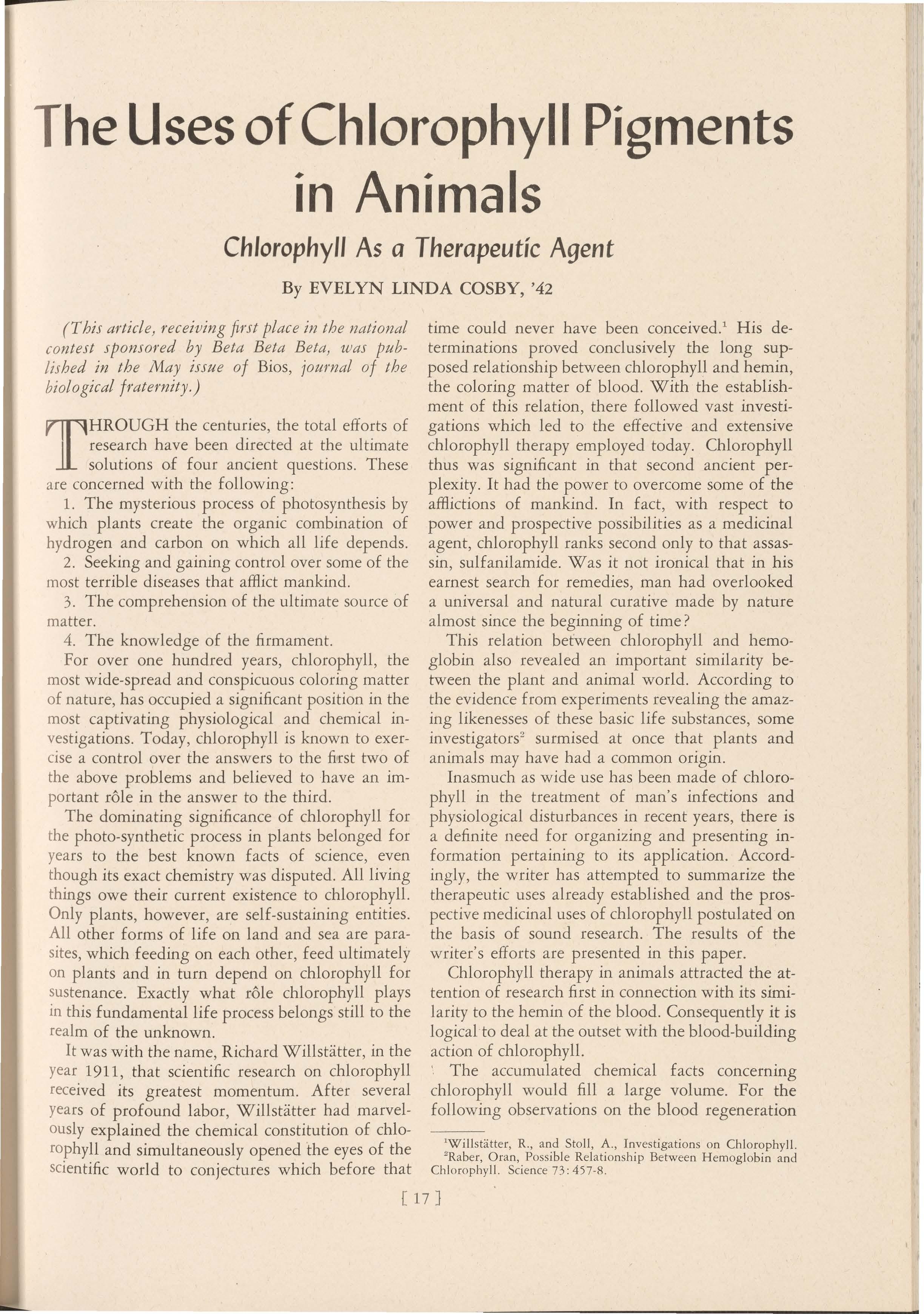
By EVELYN LINDA COSBY, '42
(This article, receiving first place in the national con test sponsored by Beta Beta Beta , was publis hed in the May issue of Bios, journal of the biological fraternity.)
THROUGH the centuries, the total efforts of research have been directed at the ultimate solutions of four ancient questions These are concerned with the following:
1. The mysterious process of photosynthesis by which plants create the organic combination of hydrogen and carbon on which all life depends.
2. Seeking and gaining control over some of the most terrible diseases that afflict mankind.
3. The comprehension of the ultimate source of mat ter.
4. The knowledge of the firmament .
For over one hundred years, chlorophyll, the most wide-spread and conspicuous coloring matter of nature, has occupied a significant position in the most captivating physiological and chemical investigations. Today, chlorophyll is known to exercise a control over the answers to the first two of the above problems and believed to have an impor tant role in the answer to the third.
The dominating significance of chlorophyll for the photo-synthetic process in plants belonged for years to the best known facts of science, even thoug h its exact chemistry was disputed. All living thing s owe their current existence to chlorophyll. Only plants, however, are self-sustaining entities. All other forms of life on land and sea are parasites, which feeding on each other, feed ultimately on plants and in turn depend on chlorophyll for sustenance. Exactly what role chlorophyll plays in this fundamental life process belongs still to the realm of the unknown.
It was with the name, Richard Willstatter, in the year 1911, that scientific research on chlorophyll received its greatest momentum. After several years of profound labor, Willstatter had marvelously explained the chemical constitution of chlorophyll and simultaneously opened the eyes of the scientific world to conjectures which before that
time could never have been conceived. 1 His determinations proved conclusively the long supposed relationship between chlorophyll and hemin, the coloring matter of blood. With the establishment of this relation, there followed vast investigations which led to the effective and extensive chlorophyll therapy employed today. Chlorophyll thus was significant in that second ancient perplexity. It had the power to overcome some of the afflictions of mankind In fact, with respect to power and prospective possibilities as a medicinal agent, chlorophyll ranks second only to that assassin, sulfanilamide. Was it not ironical that in his earnest search for remedies, man had overlooked a universal and natural curative made by nature almost since the beginning of time?
This relation between chlorophyll and hemoglobin also revealed an important similarity between the plant and animal world. According to the evidence from experiments revealing the amazing likenesses of these basic life substances, some investigators 2 surmised at once that plants and animals may have had a common origin.
Inasmuch as wide use has been made of chlorophyll in the treatment of man's infections and physiological disturbances in recent years, there is a definite need for organizing and presenting information pertaining to its application. Accordingly, the writer has attempted to summarize the therapeutic uses already established and the prospective medicinal uses of chlorophyll postulated on the basis of sound research. The results of the writer ' s efforts are presented in this paper.
Chlorophyll therapy in animals attracted the attention of research first in connection with its similarity to the hemin of the blood. Consequently it is logicalto deal at the outset with the blood-building action of chlorophyll.
· The accumulated chemical facts concerning chlorophyll would fill a large volume. For the following observations on the blood regeneration
1Willstiitter, R , and Stoll, A ., Inv es tigations on Chlorophyll.
2 Raber, Oran, Possible Relationship Between Hemoglobin and Chlorophyll. Science 73: 457-8.
[ 17]

properties of chlorophyll, only those accounts vital for the understanding of the immediate topic and of subsequent expositions must suffice.
Chlorophyll, according to the fundamental investigations of Willstatter ,3 is not a simple body, but it consists of two components, blue-green chlorophyll and yellow-green chlorophyll. Chemical analysis of the first chlorophyll gives the formula:
(C a2H xoO N,Mg) (COO CH 3) (COO C oH x9 ) plus ½H2O while the second has the formula: (Ca2H, sO2N4Mg) (COO CH 3) (COO C oH 39). Both chlorophyll and hemin, have a unit of four pyrrole rings and each has an essential metallic atom, magnesium for chlorophyll and iron for hemoglobin. Chemical treatment of hemin or of chlorophyll removes the metallic atom and produces for each the same compound, aetioporphyrin. 4
Much controversy formerly prevailed regarding the regeneration of hemoglobin in the presence of chlorophyll. According to E. Biirgi, 5 C. W Saunders/ S. Hirasaw , 7 and Edward Rentz ,8 chlorophyll does augment hemoglobin regeneration, but L. Marchlewski and W. Urbanczyk,° state that no conversion takes place. Dr. Howell Hughes in an attempt to settle the question selected for his thesis at the University of Liverpool, THE EFFECT OF CHLOROPHYLLON THE REGENERATIONOF HEMOGLOBIN. 1 0 He and E. Biirgi offer conclusive and favorable results.
Rabbits were the test animals used by both investigators. The rabbits were made anemic by repeated hemorrhages of the ear. During the period of recovery, the test animals were fed chlorophyll in olive oil and the controls received equal amounts of oil.
From experimental evidence, n the investigators agree the animal body is capable of converting chlorophyll to hemoglobin, if given in small doses. Large doses failed to produce any effect. It is suggested that this may be due to increased ab-
"Willstatter, stoll, op. cit.
'Wertheim, E. , Textbook of Organic Chemistry, 653-654.
"Biirgi, E., Cor. Bl. Schweiz Aertze, 4 6: 449; Das Chlorophyll Als Pharmakon 14-29.
' Saunders, C. W., Proc e eding s o f the Socie ty o f Exp. Bi o 23:788
7 Hirasaw, S., Japanese Medical World, 3: 36
8Rentz , E , Chlorophyll and Blutbild , Skand. Arch. Physiol., 57: 121.
0 Marchlewski, L., and Urbanczyk , W. , Biochem, Z , 263: 166.
' "Hughe s, J. H. and Latn e r, A L. , Chlorophyll and Hemoglobin Regeneration, Jour. Physiol., 86: 388-95
11 Hughe s, Latn e r, op. cit. 390- 395 .
sorption of magnesium. Magnesium-free chlorophyll derivatives aid regeneration when administered by mouth. This bears out the above, that increased absorption of magnesium may stop regeneration. Crude chlorophyll, in large doses, exerts a favorable influence on hemoglobin regeneration. It seems there is some substance in the crude chlorophyll which counteracts the toxic effect of chlorophyll itself Bi.irgi reports that chlorophyll has a stronger hematogenic effect than iron, though a combination of iron and chlorophyll was most powerful!.
These facts , according to Hughes, explain the confusion of the literature on hemoglobin regeneration and chlorophyll as the result depends on the dosage and the purity of the sample.
Significance must be attached to the role played by intestinal bacteria in consideration of this problem. Chlorophyll is known to be broken down by these bacteria and it is quite likely tha! one of these decomposition products is used for subsequent synthesis of hemoglobin This possibility is borne out by the failure of subcutaneous injections of magnesium-free derivatives to produce any effect. It must be taken into account also that chlorophyll may be acting as a physiological stimulant of the bone marrow and is not really connected with the actual chemistry of regeneration of hemoglobin. This possibility is under investigation
Both Bi.irgi and J. Harvey Kellogg investigated the effects of chlorophyll on anemia in humans. It has been shown that iron , calcium , and magnesium of the food is separated in the digestive tube from the complex molecules of foodstuffs and that a diet may, even though rich in iron, be insufficient for the production of hemoglobin, if it does not furnish along with the iron the other necessary elements. Kellogg argues that chlorophyll offers these necessary elements. His belief is based upon the remarkable improvement following the administration of chlorophyll to patients suffering from anemia and tuberculosis of the lungs. A significant increase in the number of erythrocytes and an improvement in the general health was reported. 1 2
In man's fight against infection, two major methods have been employed: first, that of antisepsis, or the destruction of bacteria by chemical means; and second, the immunologic approach The great objection to the majority of antiseptic agents employed in chemotherapy has been their irritating and toxic effects, even to the point of actual tissue destruction of the infected individual along with the destruction of the infectious agent.
' 'Rudolph, C., Valu e of Chlorophyll Therapy, Clinical Medic ine a nd Surg e ry, 37: 119 - 12 1
18]
Their use has been restricted to topical and local applications.
For this reason, the discovery of a substance highly destructive to bacteria, but non-toxic to the surrounding tissue, is of inestimable value in fighting infection. The use of chlorophyll in the treatment of infections, particularly in local suppurative lesions, represents a new approach to the tre atment of such conditions, combining a backg round of chemotherapy with a much broader biological method.
Investigators at Temple University in Philadelphia discovered a curious thing: the green solut ion seemed to strengthen the walls of the body cells of animals. That led them to ask, might not chlorophyll help the body combat bacterial invaders and at the same time soothe tissues? In the laboratory, chlorophyll possessed no power to kill germs in a test tube; but in contact with living tissues, it appeared to increase the resistance of cells and inhibit the growth of bacteria.
Benjamin Grus'k:in, in an attempt to investigate this supposition had eighteen of his colleagues test chlorophyll in their daily practices. The chlorophyll solutions and ointments were prepared by the Depa rtment of Experimental Pathology at Temple University. Gruskin first reported on this research in July, 1940. His paper reviewed some 1,200 cases of "widely diverse character, ranging from acute infections of the upper respiratory tract and accessory sinuses to chronic ulcerative lesions of various types associated especially with varices, sinuses and fistulae." 1 3 There were two major types of lesions in which chlorophyll seemed to be particularly effective: first, in the treatment of open wounds and second, in the treatment of deep infections associated with drainage tracts communicating within the body cavities.
Some of the fields in which chlorophyll was employed were: otorhinolarynology, surgical infections, proctology, gynecology, and dermatology. Th e patients ranged from children to elderly individuals. The length of treatment varied from a single administration of the drug to prolonged treatment of as long as a month. Sometimes daily treatments were administered with no evidences of skin irritation or other harmful effects. No case was recorded that didn't report cure or improvement.
T he most spectacular results occurred in the treatment of 1,000 cases of respiratory infections -s inusitis, rhinitis, and head colds. Chlorophyll packs, inserted into the sinuses, had a drying ef-
13 G ruskin, S., Chlorophyll, Its Therapeutic Place in Acute and Suppurative Disease, The American Journal of Surgery, 49:49-55.
feet, cleared up congestion, and gave immediate relief. Congested head colds were cleared in twenty-four hours. Dr. Robert F. Ridpath and Dr. T. Carroll Davis, concerning the application of chlorophyll in otolaryngology, further state: "chlorophyll is preferred because it is less irritating than colloidal silver salts. The results obtained with chlorophyll packs have been very pleasing in that the drainage from the sinuses seems to be tremendously increased, so that a number of patients declared that one treatment had cleared up their cold. We do not mean to indicate that one treatment will cure all acute cases, but it has rarely been necessary to give more than three." 14
With cases of appendicitis resulting in spreading peritonitis appendectomies had been performed. Chlorophyll solutions were then flooded into the wounds through drainage tubes. Regarding a particular case, these irrigations began Qn January 13, 1935, "on January 15, the wound was redressed and disclosed healing. The wound was almost completely healed on January 19, and the patient was discharged on January 21, to report to his physician for further treatment." 15
In connection with infections of the mouth, it is interesting to note that Vincent's angina and advanced pyorrhea can be successfully controlled by intense use of chlorophyll. In this latter condition, it is actually injected into the gums and between the teeth as well as applied superficially. Within less than a month the gums tighten up about the teeth. All purulent discharge ceases and the infection appears to clear up entirely.' a
Of greater significance are the reports on the effects of chlorophyll in streptococcic septicemia. It was found that daily administration of chlorophyll intravenously, produced no toxic effect but caused a recovery in a period of six days. The blood stream could not be kept negative for streptococci without the daily use of chlorophyll. "Apparently no ill effects were suffered from the chlorophyll, as repeated blood urea, creatinine, and urine analysis were done, and there was no evidence of hepatic damage." 17 It has occurred to the author that if chlorophyll is capable both of regenerating blood and of effectively fighting septicemia, chlorophyll might even surpass sulfanilamide in fighting infection. Sulfanilamide on prolonged administrations destroys the blood cells and produces anemia. Chlorophyll, on the other hand, builds up the blood and is a general tonic, as will be discussed later, while it destroys bacterial infection.
" Ibid. 57.
"'Ibid. 57.
'"Ibid, 54-55.

[ 19]
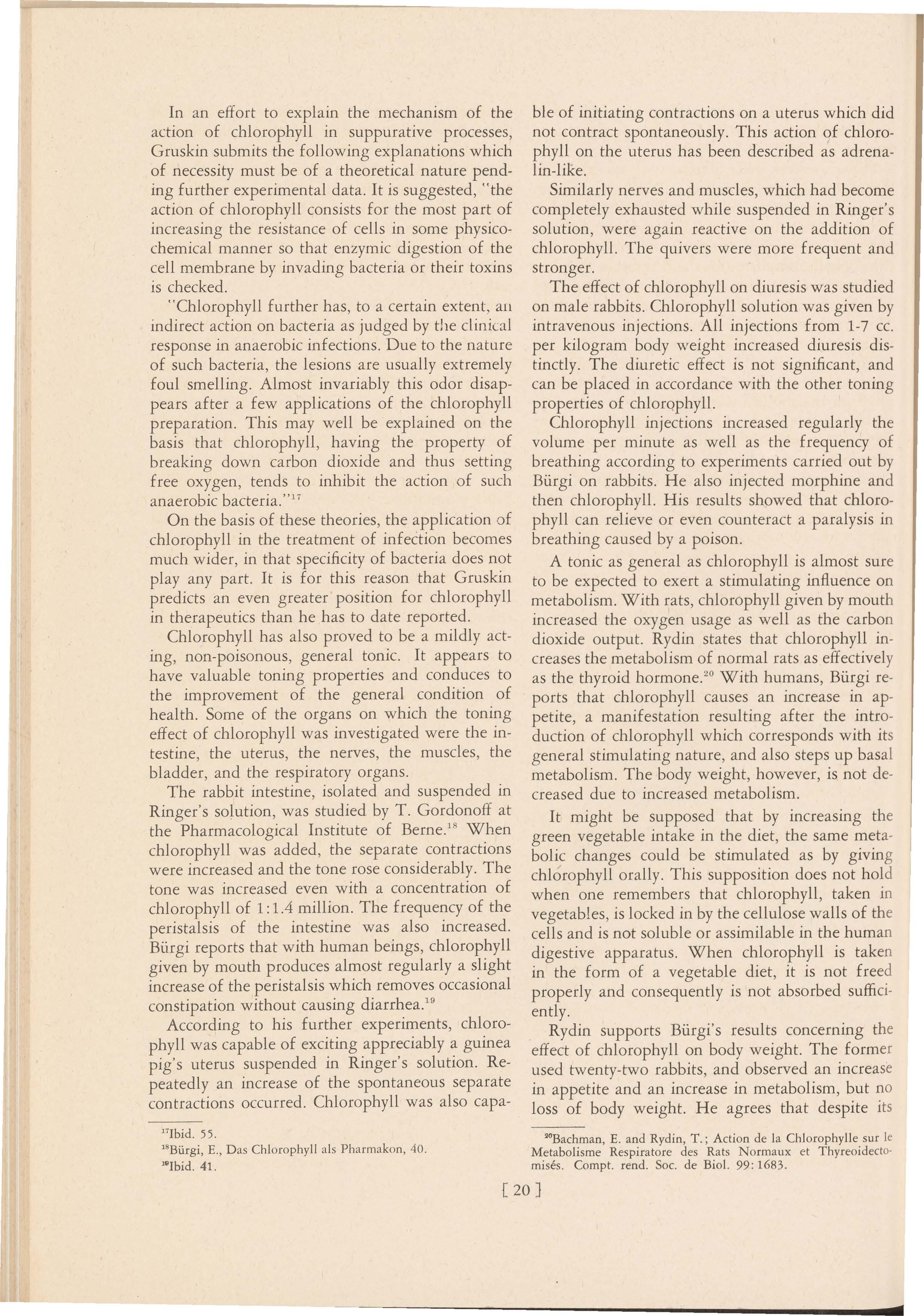
In an effort to explain the mechanism of the action of chlorophyll in suppurative processes, Gruskin submits the following explanations which of necessity must be of a theoretical nature pending further experimental data. It is suggested, "the action of chlorophyll consists for the most part of increasing the resistance of cells in some physicochemical manner so that enzymic digestion of the cell membrane by invading bacteria or their toxins is checked.
"Chlorophyll further has, to a certain extent, au indirect action on bacteria as judged by the clinical response in anaerobic infections. Due to the nature of such bacteria, the lesions are usually extremely foul smelling. Almost invariably this odor disappears after a few applications of the chlorophyll preparation. This may well be explained on the basis that chlorophyll, having the property of breaking down carbon dioxide and thus setting free oxygen, tends to inhibit the action of such anaerobic bacteria. " 17
On the basis of these theories, the application of chlorophyll in the treatment of infection becomes much wider, in that specificity of bacteria does not play any part. It is for this reason that Gruskin predicts an even greater position for chlorophyll in therapeutics than he has to date reported.
Chlorophyll has also proved to be a mildly acting, non-poisonous, general tonic. It appears to have valuable toning properties and conduces to the improvement of the general condition of health. Some of the organs on which the toning effect of chlorophyll was investigated were the intestine, the uterus, the nerves, the muscles, the bladder, and the respiratory organs.
The rabbit intestine, isolated and suspended in Ringer's solution, was studied by T. Gordonoff at the Pharmacological Institute of Berne. 1 8 When chlorophyll was added, the separate contractions were increased and the tone rose considerably. The tone was increased even with a concentration of chlorophyll of 1: 1.4 million. The frequency of the peristalsis of the intestine was also increased. Biirgi reports that with human beings, chlorophyll given by mouth produces almost regularly a slight increase of the peristalsis which removes occasional constipation without causing diarrhea. 19
According to his further experiments, chlorophyll was capable of exciting appreciably a guinea pig's uterus suspended in Ringer's solution. Repeatedly an increase of the spontaneous separate contractions occurred. Chlorophyll was also capa-
11 Ibid. 55.
18 Biirgi, E., Das Chlorophyll als Pharmakon, 40. "'Ibid 41.
ble of initiating contractions on a uterus which did not contract spontaneously. This action of chlorophyll on the uterus has been described as adrenalin-like.
Similarly nerves and muscles, which had become completely exhausted while suspended in Ringer's solution, were again reactive on the addition of chlorophyll. The quivers were more frequent and stronger.
The effect of chlorophyll on diuresis was studied on male rabbits. Chlorophyll solution was given by intravenous injections. All injections from 1-7 cc. per kilogram body weight increased diuresis distinctly. The diuretic effect is not significant, and can be placed in accordance with the other toning properties of chlorqphyll.
Chlorophyll injections increased regularly the volume per minute as well as the frequency of breathing according to experiments carried out by Biirgi on rabbits. He also injected morphine and then chlorophyll. His results showed that chlorophyll can relieve or even counteract a paralysis in breathing caused by a poison.
A tonic as general as chlorophyll is almost sure to be expected to exert a stimulating influence on metabolism. With rats, chlorophyll given by mouth increased the oxygen usage as well as the carbon dioxide output. Rydin states that chlorophyll increases the metabolism of normal rats as effectively as the thyroid hormone. 20 With humans, Biirgi reports that chlorophyll causes an increase in appetite, a manifestation resulting after the introduction of chlorophyll which corresponds with it s general stimulating nature, and also steps up basal metabolism. The body weight, however, is not decreased due to increased metabolism.
It might be supposed that by increasing th e green vegetable intake in the diet, the same metabolic changes could be stimulated as by givin g chlorophyll orally. This supposition does not hold when one remembers that chlorophyll, taken in vegetables, is locked in by the cellulose walls of th e cells and is not soluble or assimilable in the human digestive apparatus. When chlorophyll is taken in the form of a vegetable diet, it is not free d properly and consequently is not absorbed sufficiently.
Rydin supports Biirgi' s results concerning th e effect of chlorophyll on body weight. The forme r used twenty-two rabbits, and observed an increas e in appetite and an increase in metabolism, but n o loss of body weight. He agrees that despite it s
20 Bachman, E. and Rydin, T.; Action de la Chlorophylle sur le Metabolisme Respiratore des Rats Normaux et Thyreoidect omises. Compt. rend. Soc. de Biol. 99: 1683.
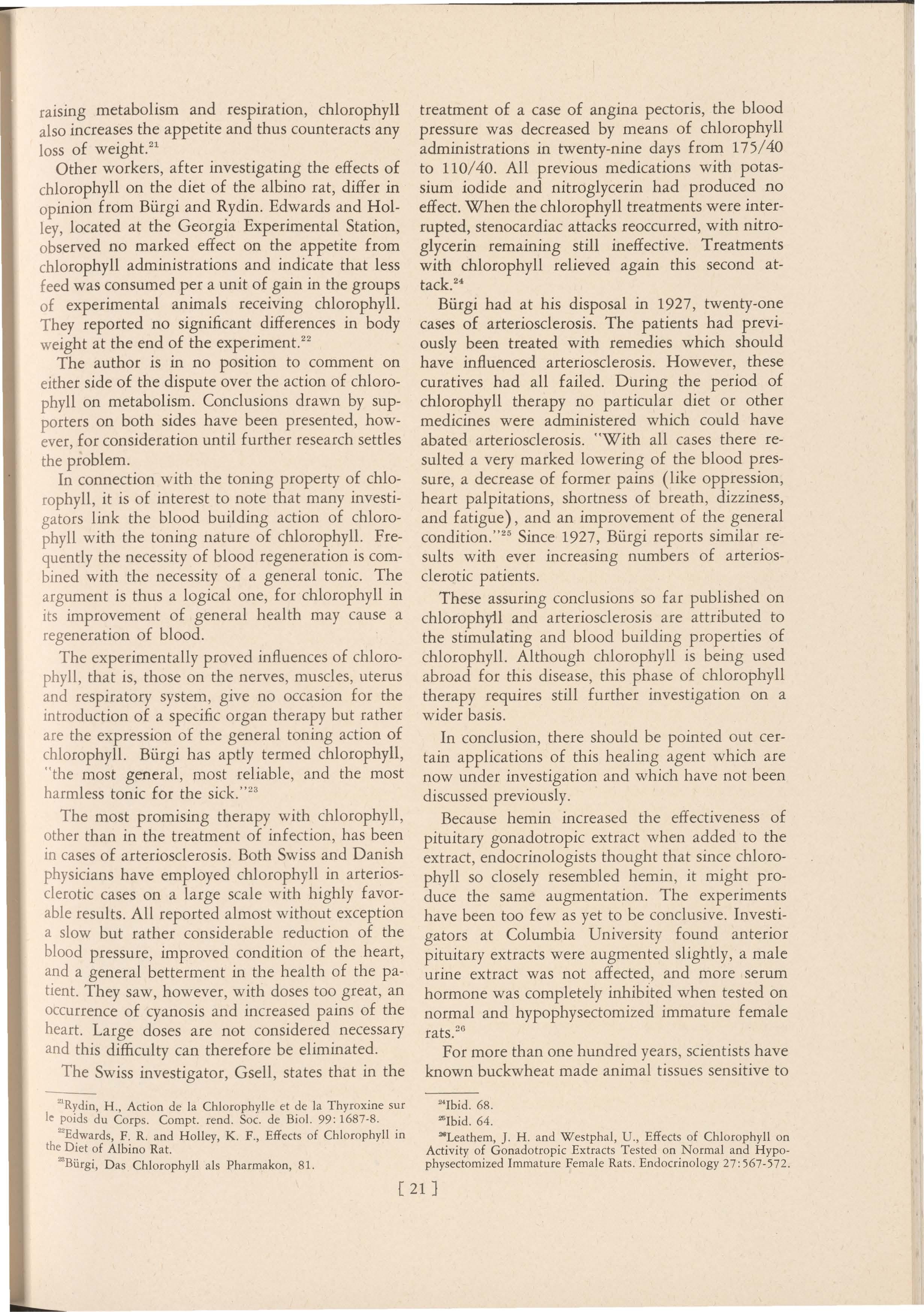
ra 1smg metabolism and respiration, chlorophyll also increases the appetite and thus counteracts any los s of weight. 21
Other workers, after investigating the effects of chlorophyll on the diet of the albino rat, differ in opi nion from Biirgi and Rydin. Edwards and Holley, located at the Georgia Experimental Station, observed no marked effect on the appetite from chlo rophyll administrations and indicate that less fe ed was consumed per a unit of gain in the groups of experimental animals receiving chlorophyll. The y reported no significant differences in body weight at the end of the experiment. 22
The author is in no position to comment on either side of the dispute over the action of chlorophyll on metabolism. Conclusions drawn by supporter s on both sides have been presented, however, for consideration until further research settles the problem.
In connection with the toning property of chlorophyll, it is of interest to note that many investiga tors link the blood building action of chlorophyll with the toning nature of chlorophyll. Frequent ly the necessity of blood regeneration is combined with the necessity of a general tonic. The argument is thus a logical one, for chlorophyll in its improvement of general health may cause a reg eneration of blood.
The experimentally proved influences of chlorophyll, that is, those on the nerves , muscles, uterus and respiratory system, give no occasion for the intro duction of a specific organ therapy but rather are the expression of the general toning action of chlorophyll. Biirgi has aptly termed chlorophyll, "th e most general, most reliable, and the most harmle ss tonic for the sick." 23
The most promising therapy with chlorophyll, othe r than in the treatment of infection, has been in cases of arteriosclerosis. Both Swiss and Danish physicians have employed chlorophyll in arteriosclerotic cases on a large scale with highly favorable results. All reported almost without exception a slow but rather considerable reduction of the blood pressure, improved condition of the heart, and a general betterment in the health of the patient. They saw, however, with doses too great, an occurrence of cyanosis and increased pains of the heart. Large doses are not considered necessary and this difficulty can therefore be eliminated .
The Swiss investigator, Gsell , states that in the
21Rydin, H. , Action de la Chlorophylle et de la Thyroxine sur le poids du Corps. Compt. rend. Soc. de Biol. 99: 1687-8
"Edw ards, F. R. and Holley, K. F., Effects of Chlorophyll in the Diet of Albino Rat.
'"Biirgi, Das Chlorophyll als Pharmakon , 81.
treatment of a case of angina pectoris, the blood pressure was decreased by means of chlorophyll administrations in twenty-nine days from 175/40 to 110/40. All previous medications with potassium iodide and nitroglycerin had produced no effect. When the chlorophyll treatments were interrupted, stenocardiac attacks reoccurred, with nitroglycerin remaining still ineffective. Treatments with chlorophyll relieved again this second attack.24
Biirgi had at his disposal in 1927, twenty-one cases of arteriosclerosis. The patients had previously been treated with remedies which should have influenced arteriosclerosis. However, these curatives had all failed. During the period of chlorophyll therapy no particular diet or other medicines were administered which could have abated arteriosclerosis. "With all cases there resulted a very marked lowering of the blood pressure, a decrease of former pains (like oppression, heart palpitations, shortness of breath, dizziness, and fatigue), and an improvement of the general condition." 25 Since 1927, Biirgi reports similar results with ever increasing numbers of arteriosclerotic patients.
These assuring conclusions so far published on chlorophyll and arteriosclerosis are attributed to the stimulating and blood building properties of chlorophyll. Although chlorophyll is being used abroad for this disease, this phase of chlorophyll therapy requires still further investigation on a wider basis.
In conclusion, there should be pointed out certain applications of this healing agent which are now under investigation and which have not been discussed previously.
Because hemin increased the effectiveness of pituitary gonadotropic extract when added to the extract, endocrinologists thought that since chlorophyll so closely resembled hemin , it might produce the same augmentation . The experiments have been too few as yet to be conclusive. Investigators at Columbia University found anterior pituitary extracts were augmented slightly, a male urine extract was not affected , and more serum hormone was completely inhibited when tested on normal and hypophysectomized immature female rats. 20
For more than one hundred years, scientists have known buckwheat made animal tissues sensitive to
24 lbid. 68.
25 lbid. 64.
"'Leathern, J H. and Westphal, U., Effects of Chlorophyll on Activity of Gonadotropic Extracts Tested on Normal and Hypophysectomized Immature Female Rats. Endocrinology 27: 567-572. [ 21]
light. Dr. 0. L. Inman of the C. F. Kettering Foundation For the Study of Chlorophyll and Photosynthesis at Antioch College carried out some experiments on albino guinea pigs. The test animals were made photosensitive through a tenday diet containing freshly ground buckwheat. On excessive exposure to light, the guinea pigs died. Inman theorizes that the chlorophyll in the buckwheat contains materials that are highly photosensitive. He hypothesizes further that since chlorophyll so highly resembles hemin, light susceptibility, may be responsible for eczema, pellagra, and even lead-poisoning. Your author offers the s~gestion that perhaps chlorophyll might be employed in the desensitizing processes for photosensitiveness.
The last application of chlorophyll to be.pointed out is one which if ever proved to be successful may stamp out the most baffiing affiiction that the medical world has yet to conquer. The disease is carcinoma or cancer. Bi.irgi reports no favorable effects of chlorophyll on cancer. A French investigator, on the other hand, reports that chlorophyll promotes a regression of the growth. 21 It is the contention of Doctor Gruskin of Temple University that chlorophyll "helps stimulate the production of connective tissue, and in this way may even be of value in the treatment of such lesions ( ulcerative carcinoma) so far as limiting their growth locally may be concerned." 2 8 He reports that work in this field has only recently been attempted, but is being pursued and will be published later.
Just how chlorophyll accomplishes its innumerable results, physicians and investigators admit they do not know. They are nevertheless enthusiastic and freely predict its wide and effective use. The medical profession in this country is on the whole conservative. It will study the effect of chlorophyll long and carefully before advising its general use. It is hoped that chlorophyll will stand future research. It is one of the most engaging substances in the field of medical investigation today.
BIBLIOGRAPHY
Bachman, E . and Ryden, H. Action de la Chlorophylle sur le Metabolisme Respiratoire des Rats Normaux et Thyreoidectomises Comp t. rend Soc. de Biol. 99: 1683. 1928-29
Bi.irgi, E. Cor. Bl Schweiz Aertze 46: 449, 1916.
21 Plagniol, C., La Toxeme Asthenisante du Cancer at le Remarquable Pouvoir Tonique du Pigment Chlorophyllin; ]our. de Med . De Paris, 53: 664-5.
28 Gruskin , op. cit. 50.
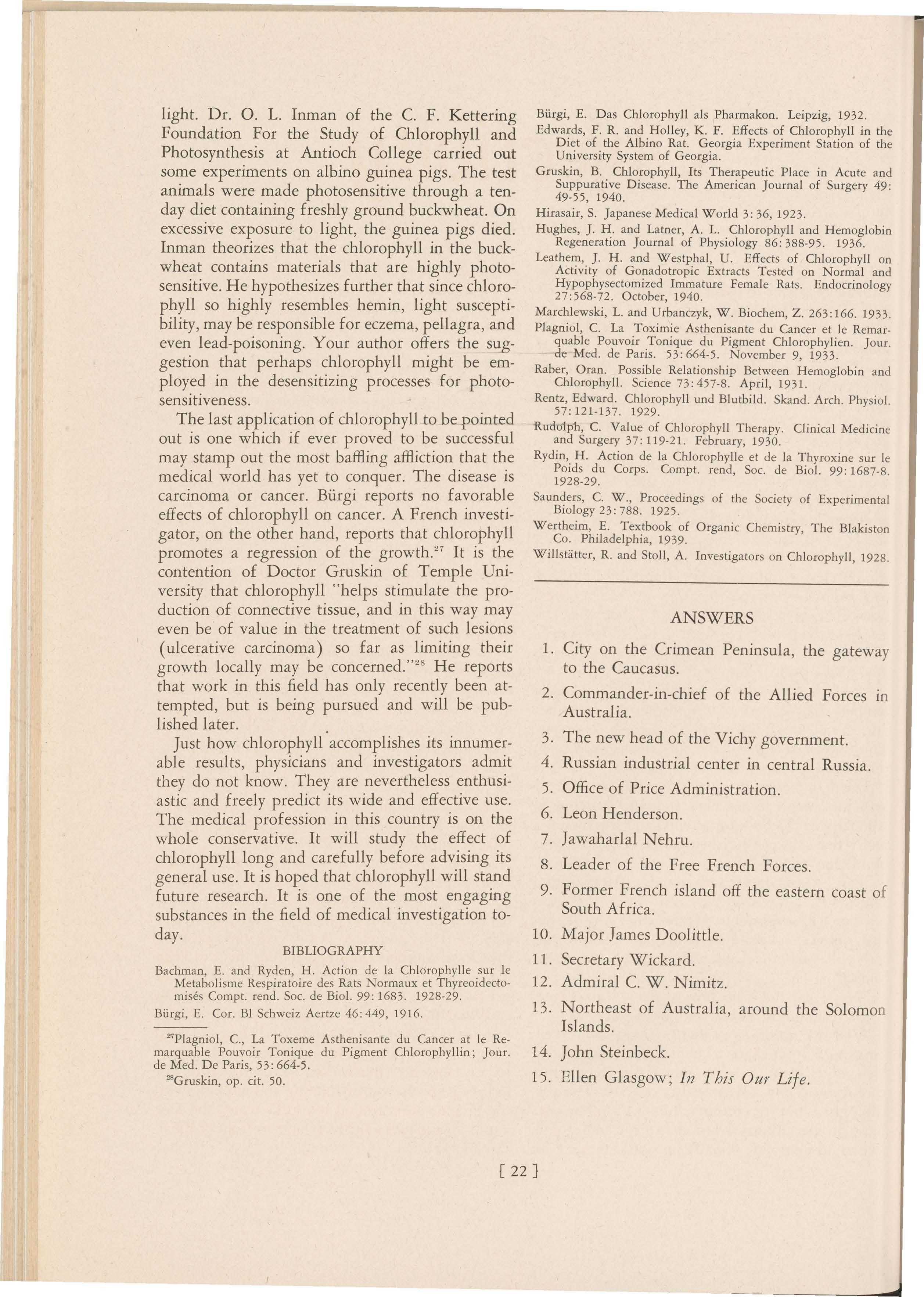
Bi.irgi, E. Das Chlorophyll als Pharmakon. Leipzig, 1932. Edwards, F. R. and Holley, K. F. Effects of Chlorophyll in the Diet of the Albino Rat. Georgia Experiment Station of the University System of Georgia.
Gruskin, B. Chlorophyll, Its Therapeutic Place in Acute and Suppurative Disease. The American Journal of Surgery 49: 49-55, 1940.
Hirasair, S. Japanese Medical World 3: 36, 1923.
Hughes, ]. H. and Latner, A. L. Chlorophyll and Hemoglobin Regeneration Journal of Physiology 86: 388-95. 1936
Leathern, ] H. and Westphal, U. Effects of Chlorophyll on Activity of Gonadotropic Extracts Tested on Normal and Hypophysectomized Immature Female Rats. Endocrinology 27:568-72. October, 1940.
Marchlewski, L. and Urbanczyk, W. Biochem, Z 263: 166. 1933
Plagniol, C. La Toximie Asthenisante du Cancer et le Remarquable Pouvoir Tonique du Pigment Chlorophylien. ]our. -de-Med. de Paris. 53: 664-5. November 9, 1933.
Raber, Oran. Possible Relationship Between Hemoglobin and Chlorophyll. Science 73: 457-8. April, 1931.
Rentz, Edward. Chlorophyll und Blutbild Skand. Arch. Physiol. 57: 121-137. 1929.
Ru-du1p1-i,C. Value of Chlorophyll Therapy. Clinical Medicin e and Surgery 37: 119-21. February, 1930
Rydin, H. Action de la Chlorophylle et de la Thyroxine sur l e Poids du Corps. Compt. rend, Soc. d e Biol. 99: 1687-8 1928-29.
Saunders, C. W., Proceedings of the Society of Experimental Biology 23: 788. 1925
Wertheim, E. Textbook of Organic Chemistry, The Blakiston Co. Philadelphia, 1939.
Willstatter, R. and Stoll, A. Investigators on Chlorophyll, 192 8.
1. City on the Crimean Peninsula, the gatewa y to the Caucasus.
2. Commander-in-chief of the Allied Forces m Australia.
3. The new head of the Vichy government.
4. Russian industrial center in central Russia.
5. Office of Price Administration.
6. Leon Henderson.
7. Jawaharlal Nehru.
8. Leader of the Free French Forces.
9. Former French island off the eastern coast of South Africa.
10. Major James Doolittle.
11. Secretary Wickard.
12. Admiral C. W. Nimitz.
13. Northeast of Australia, around the Solomo n Islands.
14. John Steinbeck.
15. Ellen Glasgow; In This Our Life.
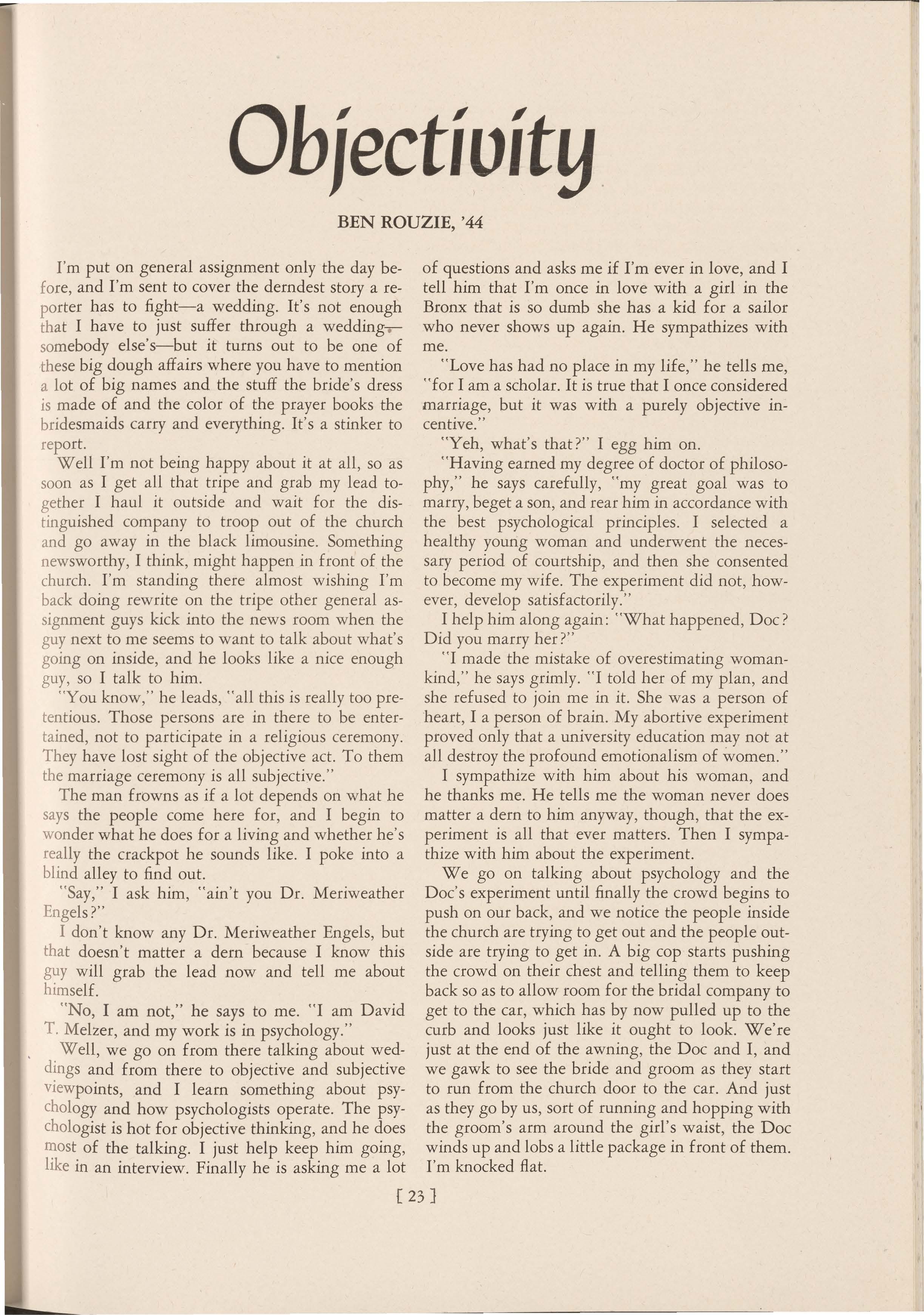
BEN ROUZIE, '44
I' m put on general assignment only the day be- of questions and asks me if I'm ever in love, and I fo r e , and I'm sent to cover the derndest story a re- tell him that I'm once in love with a girl in the p or ter has to fight-a wedding. It's not enough Bronx that is so dumb she has a kid for a sailor th a t I have to just suffer through a wedding-.-- who never shows up again . He sympathizes with som ebody else's-but it turns out to be one of me. th ese big dough affairs where you have to mention "Love has had no place in my life," he tells me, a lo t of big names and the stuff the bride ' s dress "for I am a scholar. It is true that I once considered is m ade of and the color of the prayer books the marriage, but it was with a purely objective inbridesmaids carry and everything. It's a stinker to centive. " repo rt. "Yeh, what's that?" I egg him on W ell I'm not being happy about it at all , so as " Having earned my degree of doctor of philososoon as I get all that tripe and grab my lead to- phy," he says carefully, " my great goal was to gether I haul it outside and wait for the dis- marry , beget a son , and rear him in accordance with ting uished company to troop out of the church the best psychological principles . I selected a and g o away in the black limousine. Something healthy young woman and underwent the necesnewsworthy, I think, might happen in front of the sary period of courtship , and then she consented churc h I'm standing there almost wishing I'm to become my wife. The experiment did not, howback doing rewrite on the tripe other g eneral as- ever, develop satisfactorily. " sign ment guys kick into the news room w hen the I help him along again: " What happened, Doc? guy next to me seems to want to talk about what's Did you marry her?" going on inside , and he looks like a nice enough " I made the mistake of overestimating womanguy, so I talk to him. kind," he says grimly. "I told her of my plan, and " Y ou know, " he leads, " all this is really too pre- she refused to join me in it. She was a person of tenti ous. Those persons are in there to be enter- heart, I a person of brain. My abortive experiment tained , not to participate in a religious ceremony. proved only that a university education may not at T hey have lost sight of the objective act. To them all destroy the profound emotionalism of women." the marriage ceremony is all subjective ." I sympathize with him about his woman, and T he man frowns as if a lot depends on what he he thanks me. He tells me the woman never does says the people come here for, and I begin to matter a dern to him anyway , though, that the exwon der what he does for a living and whether he ' s periment is all that ever matters. Then I sympareally the crackpot he sounds like. I poke into a thize with him about the experiment. blin d alley to find out.
We go on talking about psychology and the "Say," I ask him, "ain't you Dr. Meriweather Doc's experiment until finally the crowd begins to Engels?" push on our back, and we notice the people inside
I don't know any Dr. Meriweather Engels, but the church are trying to get out and the people outtha t doesn't matter a dern because I know this side are trying to get in. A big cop starts pushing guy will grab the lead now and tell me about the crowd on their chest and telling them to keep himself. back so as to allow room for the bridal company to "No, I am not," he says to me. "I am David get to the car, which has by now pulled up to the T. M elzer, and my work is in psychology. " curb and looks just like it ought to look. We're W ell, we go on from there talking about wed- just at the end of the awning, the Doc and I, and ding s and from there to objective and subjective we gawk to see the bride and groom as they start viewpoints, and I learn something about psy- to run from the church door to the car. And just chology and how psychologists operate. The psy- as they go by us, sort of running and hopping with chologist is hot for objective thinking, and he does the groom's arm around the girl's waist, the Doc ~o st of the talking. I just help keep him going, winds up and lobs a little package in front of them. ltke in an interview. Finally he is asking me a lot I'm knocked flat.
[ 23]
The next thing I'm able to learn is that the little package is something like nitroglycerine and fifteen people are killed when it goes off.
It's awful bloody all around in front of the church, and I can just recognize the bride by the stuff her dress is made of, and the groom by his cutaway, and one of the bridesmaids by her red hair. I get their names straightened out first because
names are the most important things you can get in a news story like this, and then I go over to see the Doc. It seems he surrenders to the cop right away after the explosion.
"She was the young woman I had selected for my experiment," he tells me. "I admit that I cared perhaps a great deal for her. The layman might call it love."
By ALYS D' A VESNE
Lakes were made that Nature might have some small vanity case in which to admire herself.
You are sufficiently whatever you are, but I cannot find out what it is. ,
Age is Youth withered by defeat. . . .
I imagine Wagner had the God I should hope to worship
New moon-supercilious eyebrow cocked over a guilty world.
Rabbit thought; jumping about-nibbling at ideas ....
Music is a magnet that draws the iron of my soul into a lump in my throat. . . .
You have looked in my eyes-you have seen nothing-it is not for you that the tenants of my soul shall peep out of their windows.
I have heard a song that withdrew all laws of gravitation and I soared upward, upward. . . .
Talking, she is exact, choosing each word as a strand of hair to complete the woven braid.
You have attained the courage of smiles.
God gave me what had passed for a brain-had I not spoken.
The brazen sun kissed the clouds goodnight and her lipstick smeared. . . .
A husband is woman's finest hunting trophy
Some say woman was born a fool; others say that she has become one, still others know they are fools to say either.
A boy and his dog and God are walking down the road toward the setting sun-this is the element of religion.
The sun has called the singing world to sleep-All is green twilight, and the first faint star Plays with the running clouds, above the deep Dark watchfulness of pines-away and far, And everywhere, the same soft peace in view, A quiet broken only by a bird; The flight of sunset into somber blue,
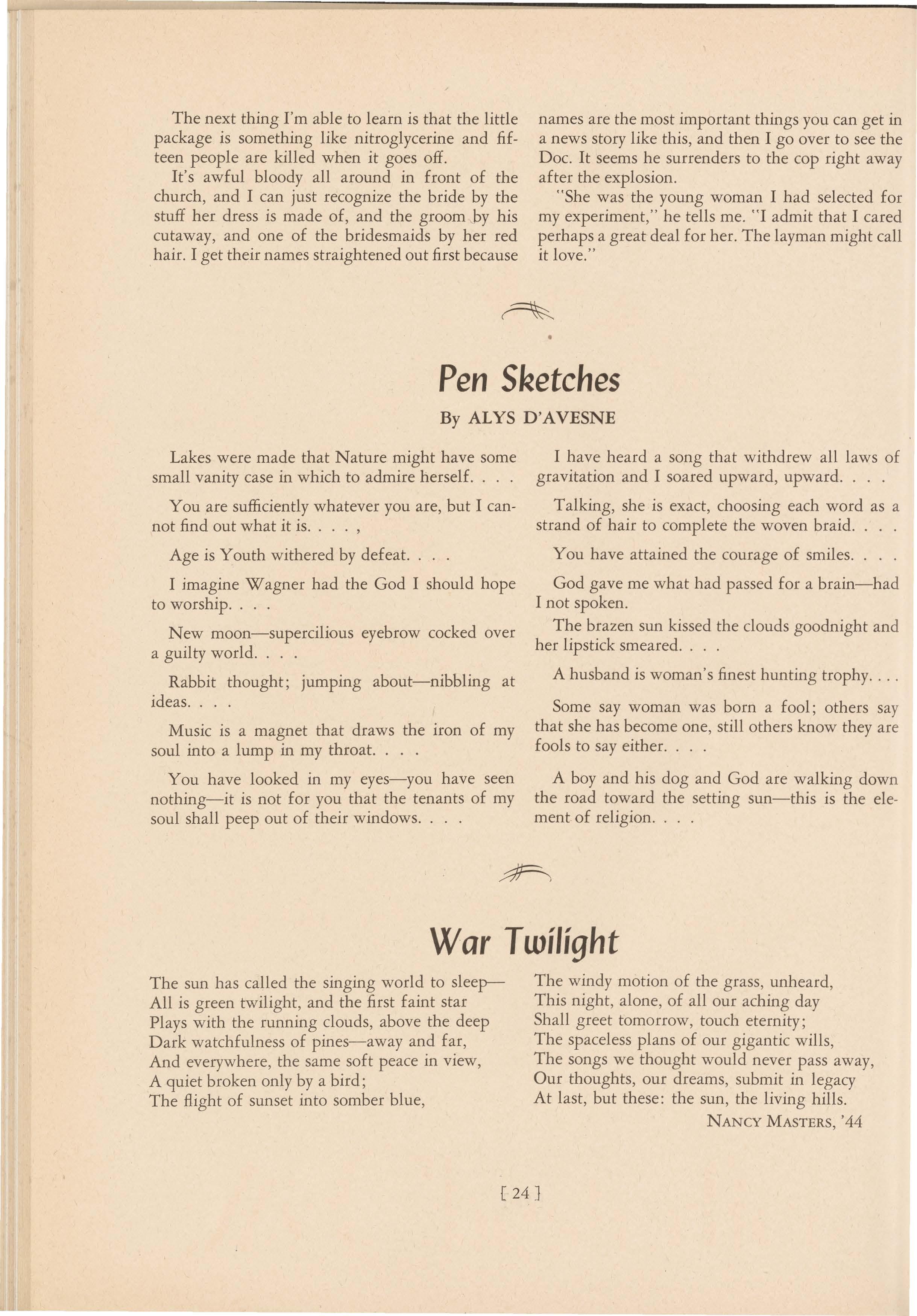
24)
The windy motion of the grass, unheard, This night, alone, of all our aching day Shall greet tomorrow, touch eternity; The spaceless plans of our gigantic wills, The songs we thought would never pass away, Our thoughts, our dreams, submit in legacy At last, but these: the sun, the living hills.
NANCY MASTERS, '44

ADRIENNE AMES, supervisor of canteen supplies for Bundles for Bluejackets, a division of"Bundles for America" which is supplying comforts to the men of the armed forces of the United States. No bundle for a man in the service is complete without the cigarette that satisfies. { ( f
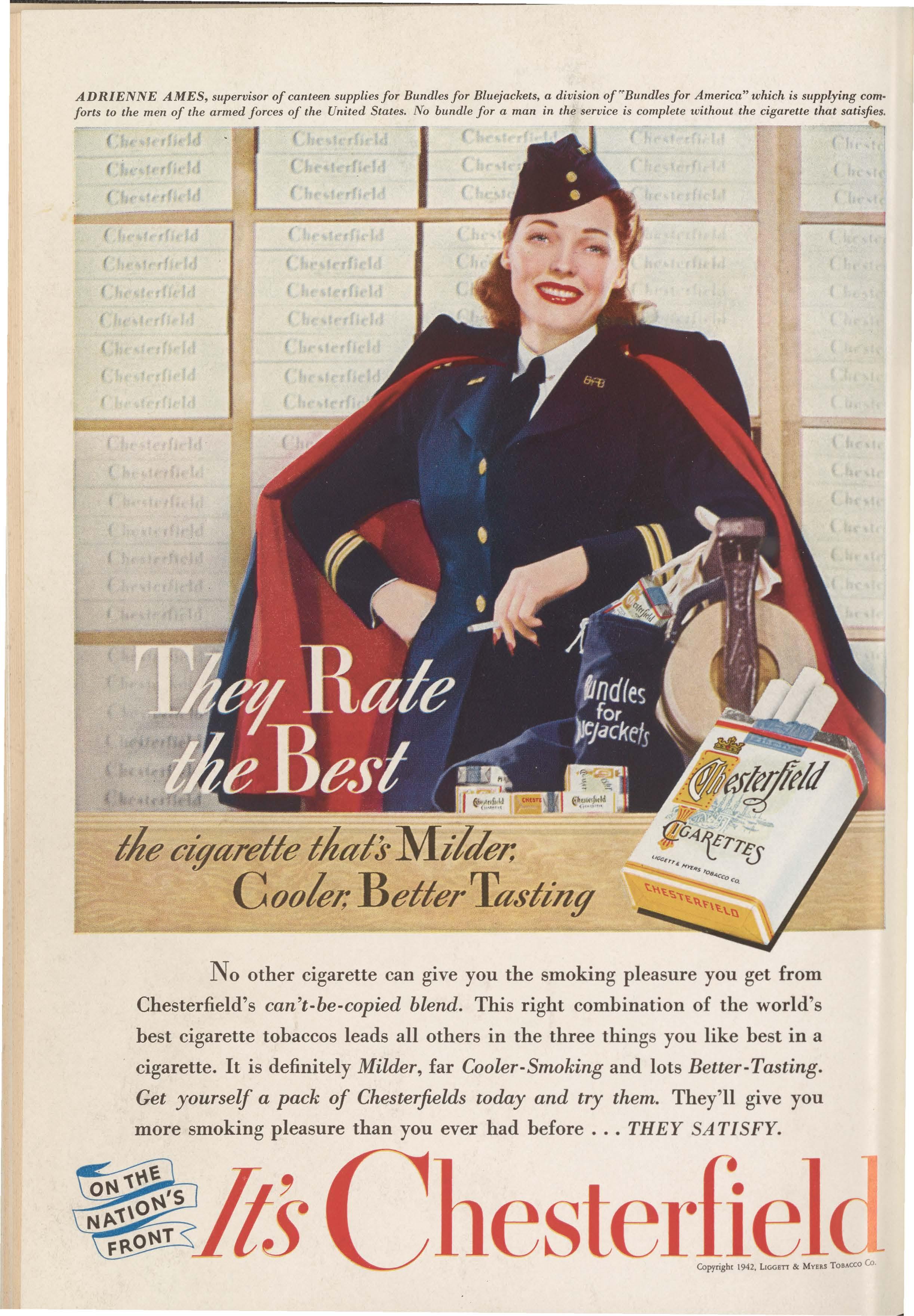
No other cigarette can give you the smoking pleasure you get from Chesterfield's can't-be-copied blend. This right combination of the world's best cigarette tobaccos leads all others in the three things you like best in a cigarette. It is definitely Milder, far Cooler-Smoking and lots Better-Tasting. Get yourself a pack of Chester.fields today and try them. They'll give you more smoking pleasure than you ever had before THEY SATISFY.